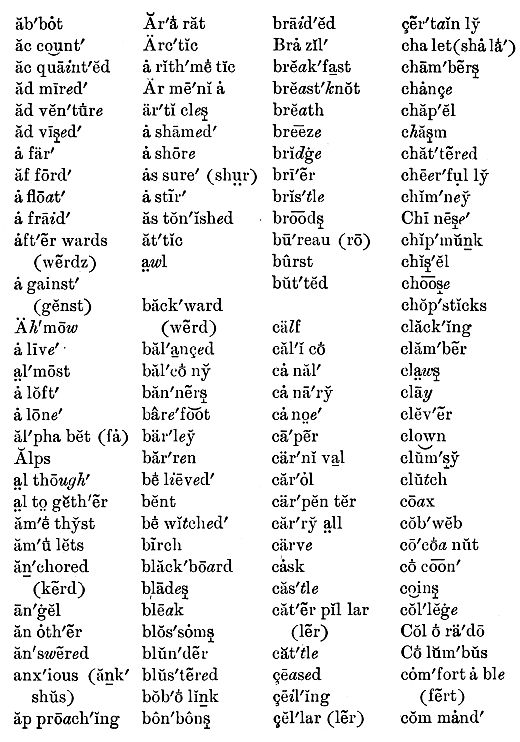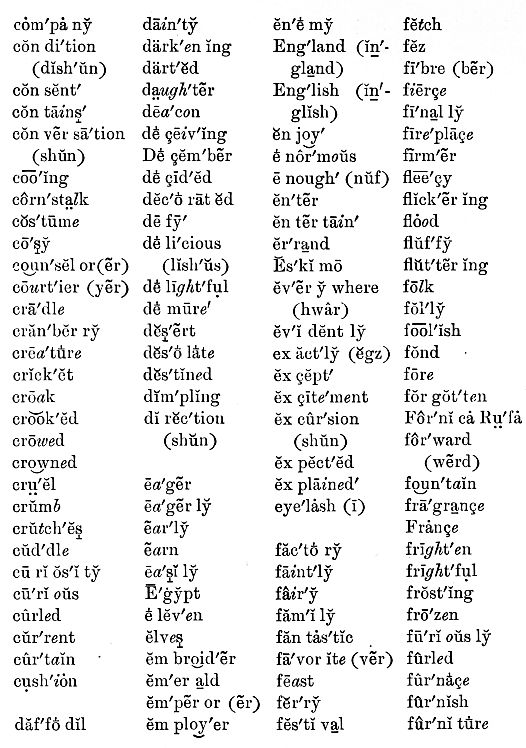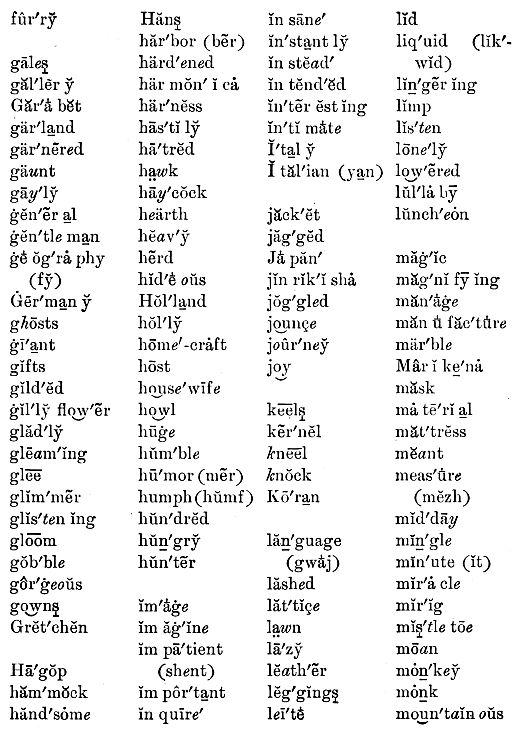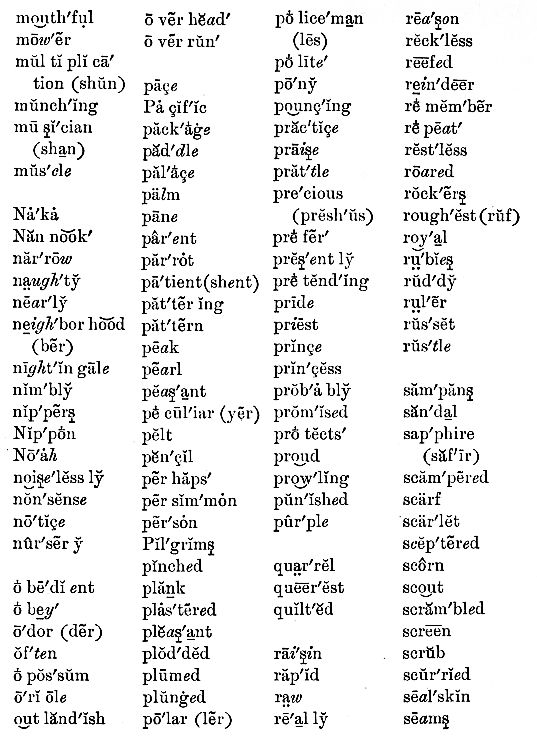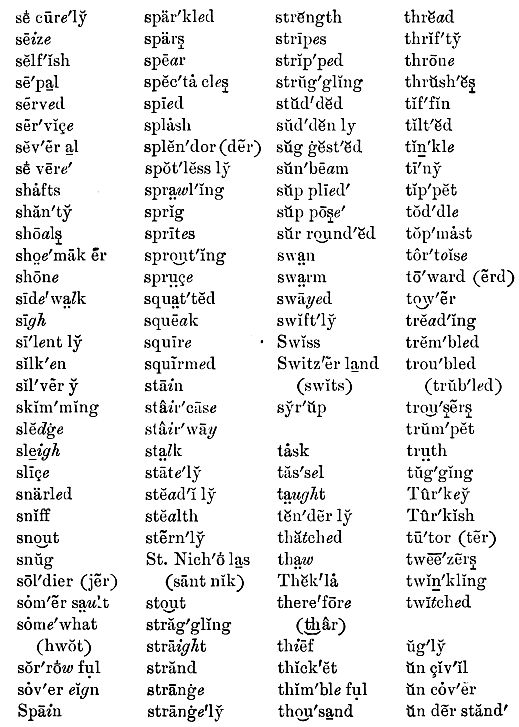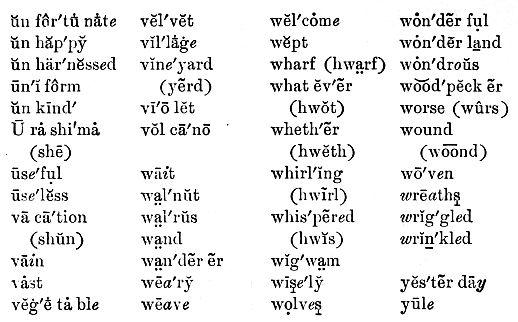
Title: The Wide Awake Third Reader
Compiler: Etta Blaisdell McDonald
Release date: May 11, 2016 [eBook #52044]
Most recently updated: October 23, 2024
Language: English
Credits: Produced by Emmy, MWS and the Online Distributed
Proofreading Team at http://www.pgdp.net (This file was
produced from images generously made available by The
Internet Archive)

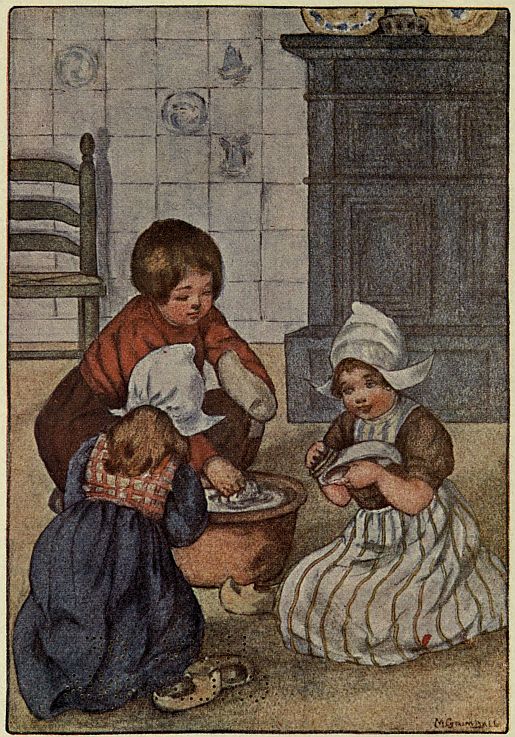

In this, the third reader of the series, great care has been taken, not only in selecting material suited to the needs and ability of the pupil, but also to arrange the selections so that he may develop the habit of acquiring interesting facts as he reads.
In the first two grades the children need to learn the mechanics of reading,—the recognition of words, the ability to find out new words for themselves by means of phonics, correct pronunciation, enunciation, inflection, expression, etc., but in this grade especial stress may be laid on learning by reading,—getting the fact and remembering it. This prepares the pupil for the actual work of studying, when he is given a book and asked for the first time to “learn the lessons.” The questions at the end of many of the lessons should be read and answered by the pupil after he has read the selection. His answers should be thoughtfully prepared and correctly stated.
Especial attention is called to the fact that the selections in this book are almost exclusively copyrighted material, and have never been and cannot be used in other series of readers. This avoids the tiresome repetition of stories, read first in one book and then again and again in others.
Many of the selections are valuable from a literary standpoint, and the pupils will read with real enjoyment stories by Laura Richards, Mary E. Wilkins, Anna von Rydingsvärd, Helen Hunt Jackson, and other authors, noted for their skill in writing stories for children.
The selections which deal especially with child life and interests in other countries will broaden the child’s view of the world, prepare him for the study of geography, and help him to be a wide awake child, just the child whom this Wide Awake Series is intended to develop.
The selections, “Little Grandmother’s Shoes,” “Children of a Sunny Land,” “The Little Plant,” “The Little Goatherds,” “Great-Great-Grandma’s Christmas in England,” “The Whipping Boy,” “The Christmas Spruce Tree,” “The Eve of St. Nicholas,” “The Little Turkeys,” “The Children of Armenia,” “Ahmow,—the Wolf,” “The Emperor and the Peasant,” and “The Christmas Monks,” are used by arrangement with the Lothrop, Lee and Shepard Company.
| PAGE | ||
| All the Children of all the World | 9 | |
| The Song Sparrow’s Work | Etta Austin Blaisdell | 15 |
| Dutch Children | 20 | |
| A Little Dutch Girl | Edith Colby Banfield | 25 |
| The Great Feast | Laura E. Richards | 26 |
| Little Grandmother’s Shoes | 30 | |
| Little-Folk Land | Edith Colby Banfield | 33 |
| Children of a Sunny Land | ||
| A Strange Milk Wagon | 35 | |
| A Ride in a Chair | 36 | |
| The Carnival | 39 | |
| The Little Plant | Anna von Rydingsvärd | 42 |
| Two Ways | Laura E. Richards | 44 |
| A Song in the Woods | Louise C. Moulton | 46 |
| How the Corn Grew | Julia Dalrymple | 47 |
| “Do You Know?” | Edith Colby Banfield | 51 |
| The Little Goatherds | 52 | |
| Swiss Children | 56 | |
| Lullaby-Land | Edith Colby Banfield | 60 |
| The Stone Blocks | Laura E. Richards | 61 |
| Great-Great-Grandma’s Christmas in England | 63 | |
| The Whipping Boy | 69 | |
| The Christmas Spruce Tree | Anna von Rydingsvärd | 72 |
| Emily Dickinson | 76 | |
| The Eve of St. Nicholas | 77 | |
| Robin Redbreast | William Allingham | 81 |
| “The Little Turkeys” | ||
| In School | 83 | |
| At Home | 88 | |
| “Gillyflower Gentleman” | Laura E. Richards | 91 |
| The Ruler | Laura E. Richards | 93 |
| The Moon | Edith Colby Banfield | 95 |
| The Children of Armenia | 96 | |
| Armenian Homes | 100 | |
| The Nest | Helen Hunt Jackson | 104 |
| Ahmow—The Wolf | Frederick Schwatka | 106 |
| Eskimo Children | 113 | |
| The Dream-Ship | Blanche M. Channing | 117 |
| A Trip to Japan | Charlotte Chaffee Gibson | 118 |
| Urashima | Charlotte Chaffee Gibson | 125 |
| A Day | Emily Dickinson | 130 |
| The Ants’ Monday Dinner | Helen Hunt Jackson | 131 |
| My Ant’s Cow | Helen Hunt Jackson | 139 |
| Colorado Snow-Birds | Helen Hunt Jackson | 148 |
| The Peterkins’ Excursion after Maple Syrup | Lucretia P. Hale | 153 |
| The Grass | Emily Dickinson | 164 |
| Sunset | Emily Dickinson | 165 |
| The Baby Squirrels | Julia A. Schwartz | 166 |
| The Baby that Sleeps in a Pocket | Julia A. Schwartz | 180 |
| The Emperor and the Peasant | Anna von Rydingsvärd | 194 |
| The Christmas Monks | Mary E. Wilkins | |
| The Garden | 203 | |
| Peter and the Prince | 206 | |
| The Prettiest Doll | 210 | |
| Christmas Gifts | 214 |
I wish you would try to think this morning about all the children in all the world.
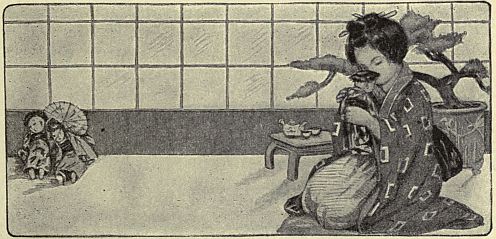
There are thousands and thousands of them, and they are doing all sorts of things this very minute.
Some of them are wide awake and some are in![]() 10
10![]() bed and fast asleep. Some are in school and some
are playing out of doors.
bed and fast asleep. Some are in school and some
are playing out of doors.
Some live in such hot countries that they lie in the shade of big palm trees to keep cool. Others are in such a cold country that they see nothing but ice and snow, and they are dressed in furs from head to foot.
When you read stories about the children in other lands, do they seem to you like fairy stories?
I want you to know that all these children are real boys and girls, and they work and play and have happy times together, just as you do.
Perhaps when you read about the children in the far North you will wish that you were an Eskimo boy, living in a snow hut, wearing thick furs, and riding over the fields of snow in a sled drawn by dogs.
Or perhaps you would rather be a little Indian and live in a wigwam in the forest, learning to paddle a canoe, and to fish and hunt.
While you are here in this beautiful schoolroom,
learning to read and write and draw and sing, there![]() 11
11![]() are thousands of other children who never saw a schoolhouse,
and who will grow up to be men and women
without even learning to read.
are thousands of other children who never saw a schoolhouse,
and who will grow up to be men and women
without even learning to read.
You can read stories about these people, and as you grow older perhaps you will know more about them, but they will probably never hear of you.
Of course, there are many thousands of children everywhere who are in school this morning.
Think of all the boys and girls in every town in the whole United States, who see the flag with its stars and stripes floating over their schoolhouses, and who learn to sing “America.”
In France the children wave a flag of red, white and blue, and learn a song about their country, but their flag is not like yours, and you could not understand one word of their French song.
The little English children sing a song about their
country and their king which you could understand,
and they read in books like yours. But then, there
are the children who live in Germany, and learn to![]() 12
12![]() read in German, and the children who live in Italy
and read Italian books, and many, many others.
read in German, and the children who live in Italy
and read Italian books, and many, many others.
Oh, there are so many children in the world!
In Japan and China the children use the queerest books that you ever saw. The words go up and down the page, and the stories begin at the end of the book, and at the bottom of the page. The words look like this:—

Did you ever see such funny words?
The boys and girls in these other countries do not go to school all of the time. They have holidays and vacations, and they play out of doors in the long summer days and the cold winter weather, just as you do.
You would enjoy playing with these children, even if you could not talk with them. I know you would like to fly big kites with the boys in Japan, or skate down the canals with the little Dutch boys.
And as for dolls! I am sure there are as many dolls
in the world as there are little girls, and perhaps more,![]() 13
13![]() because some little girls have so many dolls that
they cannot play with all of them.
because some little girls have so many dolls that
they cannot play with all of them.
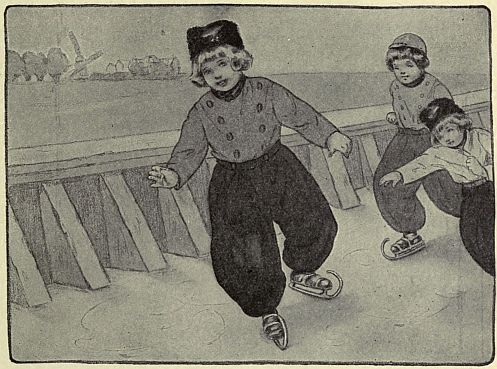
You would like to play with the queer Chinese dolls in their beautiful silken robes, or with the Eskimo dolls that are carved out of bone and are dressed in furs and sealskin.
The Indian girl has wooden dolls dressed in bright
blankets, with beads and feathers. The little French
girl has a big wax doll, with blue eyes that shut![]() 14
14![]() when she lies down, and pop open when she sits up
again. She wears beautiful gowns and big hats with
feathers and ribbons.
when she lies down, and pop open when she sits up
again. She wears beautiful gowns and big hats with
feathers and ribbons.
Wouldn’t it be fun to have a dolls’ party to-day, if the dolls from all over the world could come?
These dolls might be dressed in furs, or silks, or blankets; they might be made of wax, or bone, or wood. But if they could talk they would tell you that the little girl who owns them loves them, and that, whether she lives in a snow hut or a tent in the desert, she has a loving father and mother and a happy childhood.
Are there many children in all the world?
What are some of them doing this very minute?
If you should go to school in Germany, what would you have to do first?
What does a little German child have to do when he first goes to school in our country?
Tell all the things you can that all the children in the world do almost every day.
In the forest where the birds live there is always work to do.
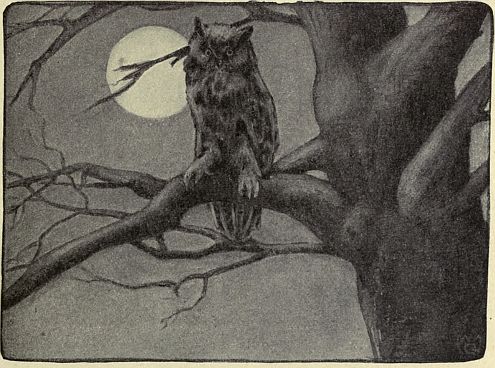
The woodpecker is a carpenter. He climbs up and down the trees and chops a hole in the trunk of one of them to make his home.
The crow flies down to the ground, and walks about in the fields.
He is the birds’ farmer. Toward evening, when he cries, “Caw! Caw!” he means that the earth needs rain.
The owl is the night policeman. He watches the rats and mice, and keeps them out of the farmer’s fields.
The kingbirds are the soldiers. They fight the birds that come over from the next forest, and drive them away.
The hawks have sharp eyes, and can see a long way. They are the scouts, and tell the soldiers when the enemy is coming.
The whip-poor-wills can see in the night, so they are the birds’ night watchmen.
The orioles are weavers. They weave their nests, and hang them in the tallest trees.
One of the birds is a thief, and steals eggs from the nests of the other birds, but I shall not tell you his name.
So all of the birds have work to do in the forest.
What do the song birds do? Ah! they have their work, too. They sing cheerfully while the other birds work, and make the hours short and the day happy.
They sing of the goodness of God, and of the beauty in the forest and sky.
If there were no song birds, the workers might forget all of these lovely things. Then their hearts would be as hard as the tree the woodpecker is chopping.
One spring morning the song birds were singing so beautifully that every one listened.
The woodpeckers cried, “Plitt! plitt!” The crows screamed, “Rah! rah!” and the blackbirds laughed with glee. This meant that they liked the songs.
In the nests were many baby birds. They liked to hear the songs, too, so they stretched up their little heads.
But they could not understand the songs about the
sky and the forest. You see, they had not seen these![]() 18
18![]() things yet, and they did not know what the songs
meant.
things yet, and they did not know what the songs
meant.
The poor babies drooped their heads and were very sad.
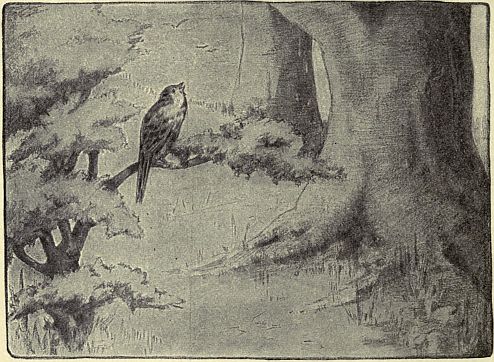
There was one bird who thought of the babies in the nests, for he had a kind heart, and loved little things.
“I will fly down and sing for them,” he thought; “perhaps it will make them happy.”
So he flew into a little bush, quite near the ground, and sang the sweetest song he knew. Over and over again he sang it, and the babies in the nests listened all the time.
“He is singing about the warm sunshine,” said the baby robins.
“He is singing about rocking in this beautiful cradle,” said the baby orioles.
Then, as the song grew sweeter and sweeter, “Listen, listen!” they cried. “Now he is singing about our mother. That is the best song of all.”
So the song sparrow sang in the little bush, telling the babies about the sun and the breezes and their mothers’ love.
He waked them in the morning; he sang them to sleep at night.
Have you never heard him singing, “Sweet, sweet, sweet, loving little mother, sweet”?
—Etta Austin Blaisdell.
How would you like to go to Holland with me to visit the little Dutch children?
First we must go to New York City in a railroad train and then get on board of one of the big ships that cross the ocean.
We shall have to travel over the water five or six days and nights in this big ship, and then ride a long way, after we come to land.
When the Pilgrims came to this country, nearly three hundred years ago, they crossed the same ocean, but it took them many weeks. They were in a small sailing vessel, and had to come very slowly.
On board of this big ship you will find a great many things to do and see. There are several hundred people on the vessel, and it is interesting to watch them. There are books to read, and games to play, and the days will go very swiftly.
Most of the time you will not be able to see land
in any direction. All you can see is the sun and![]() 21
21![]() the sky and the ocean with big waves rolling and
tossing about.
the sky and the ocean with big waves rolling and
tossing about.
I wonder what you will notice the very first thing when you reach Holland.
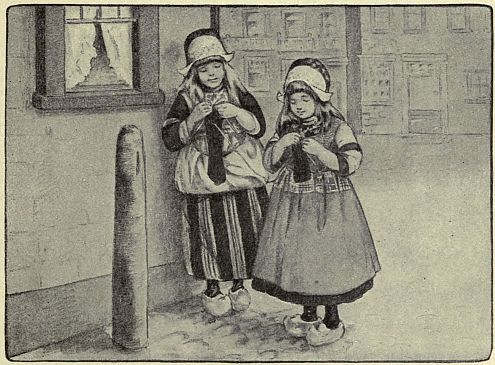
Perhaps you will see a group of children running down the street with their wooden shoes clacking on the stone walks.
Or perhaps you will see some girls standing at a![]() 22
22![]() corner knitting stockings, or a boy driving a dog
harnessed to a little cart.
corner knitting stockings, or a boy driving a dog
harnessed to a little cart.
If you take a train and ride through the country you will see many strange things.
There are big windmills everywhere, with long arms, and sails to catch the wind. These mills turn wheels to pump water and grind corn and saw wood. In Holland there are no rivers with falls and swift currents to turn the mill wheels.
In some towns there are canals instead of streets, with bridges for the people to cross from one side to the other.
In summer there are many boats going up and down the canals, but in winter the water in the canals freezes, and then everybody skates. Think what fun it must be to skate to church, to skate to market, to skate to school, and then skate home again!
A great many of the poor children in Holland wear
wooden shoes when they are out of doors. When
they go into the house they take off their shoes and![]() 23
23![]() leave them at the door. You can tell, by counting
the pairs of shoes at the door, how many children
there are in the house.
leave them at the door. You can tell, by counting
the pairs of shoes at the door, how many children
there are in the house.
Every week the children scrub their wooden shoes with soap and water until they are almost as white as snow; then they dry them in the sun, or before the fire in the big open fireplace.
These wooden shoes make fine boats, and sometimes the boys take them off and sail them in the canals. The little girls use them for doll carriages, or play they are beds, and tuck their dolls into them for a nap.
If you were walking down a village street in Holland you might see a red silk ball, or a pink silk one, hanging at the front door of one of the houses. This is to show that there is a little new baby in the house. If the ball is red, the baby is a boy; if it is pink, the baby is a girl.
There are very good schools in Holland, and all
the children go to school and learn to read and write
and sing, just as you do. But their reading and singing![]() 24
24![]() would sound very strange to you, and you could not
read one word of their writing.
would sound very strange to you, and you could not
read one word of their writing.
The Dutch children have vacations and holidays, of course. The holiday they like best of all is Santa Claus Day. It comes on the sixth day of December, and is very much like our Christmas Day.
The boys and girls put their wooden shoes in front of the fireplace, on the hearth, just as you hang your stocking near the chimney, and Santa Claus rides over the roofs of the houses on a big horse and drops presents down the chimney into the little shoes.
How would you go from your home to New York City? How long would it take?
What would you like to see in Holland?
What would you see that you never saw before?
Why do the people in Holland build windmills?
What kind of shoes do many of the children wear?
What season would you like best if you were in Holland? Why?
Once the Play Angel came into a nursery where four little children sat on the floor with sad and troubled faces.
“What is the matter, children?” asked the Play Angel.
“We wanted to have a great feast,” said the child whose nursery it was.
“Yes, that would be delightful,” said the Play Angel.
“But there is only one cooky!” said the child whose nursery it was.
“And it is a very small cooky!” said his little cousin.
“Not big enough for me!” said the child whose nursery it was.
The other two children said nothing, but they looked at the cooky with big round eyes, and their mouths went up in the middle and down at the sides.
“Well,” said the Play Angel, “let us have the feast just the same. I think we can manage it.”
She broke the cooky into four pieces, and gave one piece to the littlest child.
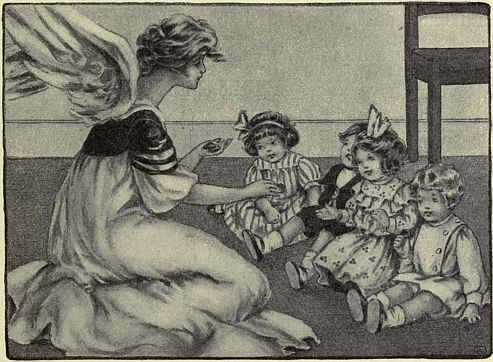
“See,” she said. “This is a roast chicken. It is just as brown and crisp as it can be. There is cranberry sauce on one side, and on the other a little mountain of mashed potato. It must be a volcano, it smokes so. Do you see?”
“Yes,” said the littlest child, and his mouth went down in the middle and up at the corners.
The Play Angel gave a piece to the next child.
“Here,” she said, “is a little pie. Outside, as you see, it is brown and crusty, and inside it is all chicken, and ham, and jelly, and hard-boiled eggs. Did you ever see such a pie?”
“No, I never did,” said the child.
“Now here,” said the Angel to the third child, “is a round cake. The frosting is half an inch thick, and inside there are chopped nuts and raisins. It is the prettiest cake I ever saw, and the best.”
“So it is,” said the third child.
Then the Angel gave the last piece to the child whose nursery it was.
“My dear,” she said, “just look! Here is an ice-cream rabbit. He is snowy white outside, with eyes of red sugar; see his long ears, and his little tail. Inside, I think you will find he is pink.
“Now, when I clap my hands and count one, two,![]() 29
29![]() three, you must eat the feast all up. One—two,—three!”
three, you must eat the feast all up. One—two,—three!”
So the children ate the feast all up.
“There,” said the Angel, “did you ever see such a grand feast?”
“No, we never did!” said all the four children together.
“And there are some crumbs left over,” said the Angel. “Come, and we will give them to the brother birds.”
“But you didn’t have any,” said the child whose nursery it was.
“Oh, yes!” said the Angel, “I had it all.”
—Laura E. Richards.
“But, Grandmother,” said little May, holding up the tiny pair of calf-skin shoes, “were these your very best shoes? Didn’t you have any shiny black ones, with a tassel on, like mine?
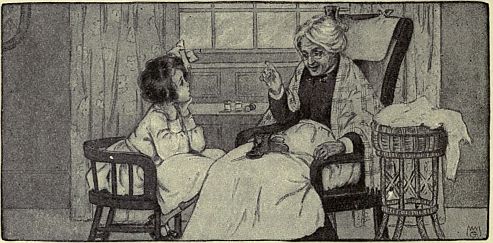
“And where did you buy them, Grandmother? Did Columbus bring them with him in his ship?”
“No, dear; Columbus didn’t bring Grandma’s shoes in his ship. He sailed back to Spain again three hundred years before these shoes were made.
“Bring your chair and sit down by me. I will tell you all about these little worn-out shoes of mine.
“When I was a little girl,” began Grandmother, “children did not wear shoes all the time. They went barefoot in the summer, except when they were dressed up. One pair of shoes had to last a whole year.
“When we went to church we used to go barefoot, carrying our shoes in our hands. At the foot of the hill we washed our feet in the brook and put on our shoes and stockings.
“Our shoes did not wear out very fast; and if we lost a shoe, we had to go barefoot till the shoemaker came again.”
“Oh, dear!” sighed May, “how dreadful! Who was the shoemaker, Grandmother, and when did he come?”
“The shoemaker,” Grandmother replied, “was a very important man when I was a little girl. ‘Shoe week’ was a busy week in the family.
“I can remember how glad we all were when father said, ‘The shoemaker will be here to-morrow.’
“That night the shoe bench was brought down from![]() 32
32![]() the attic and placed in a warm corner of the
kitchen.
the attic and placed in a warm corner of the
kitchen.
“Father and mother made a list of the shoes that were needed. We children talked about our new shoes and the shoemaker until we fell asleep.
“Early in the morning the shoemaker appeared. He carried his bag of tools and a roll of leather on his back. By seven o’clock he was seated at his bench, hard at work.
“We children used to sit on the floor beside him and watch him work. First he measured our feet and drew some paper patterns. Then he cut out the leather.
“He punched holes along the edges of the leather with a sharp awl; then the shoe was ready to sew.
“For his sewing he used a long waxed thread, with a stiff bristle at each end for a needle. All day long he would sit at his bench, putting the needles into the holes and pulling the thread through, till the shoe was sewed firmly.
“When all our shoes were made, he packed his bag and said good-by for another year.”
Domingo and his sister Marikena live in a warm, sunny land. It is the land of Brazil, where there are fruits and flowers all the year, and it is always summer.
Domingo and Marikena love the sunshine, and the birds and flowers.
They like to play out of doors in the early morning and at night, but at noon it is too hot, and every one takes a nap.
When they go to the woods they do not see crows and blue jays and woodpeckers. Instead, there are gorgeous parrots and beautiful humming-birds that are almost as large as robins.
Perhaps they see monkeys in the palm trees; and, instead of acorns, they find cocoanuts.
In their schoolroom they sing all their lessons. Is
not that a merry way? But it would seem strange to
you because you could not understand one word![]() 36
36![]() they say. You see, they do not speak English, and
they could not talk with you.
they say. You see, they do not speak English, and
they could not talk with you.
Every morning the two children are up very early and out on the balcony watching for something. Soon they call out, “leite, leite,” which means, “milk, milk.”
And what do you suppose they see? Not a wagon filled with glass jars or tin cans. Oh, no! It is only two or three cows being driven down the street by a woman.
The woman stops the cows in front of Domingo’s house, and milks one of them while the children watch her. How sweet and fresh this milk is! I wish you could have some every morning, too!
Domingo and Marikena are going with their mother to visit their cousin.
They have had their afternoon nap and it is not too hot out of doors now, as it is nearly four o’clock.
If you were going to pay a visit you would walk or ride in a car or carriage, would you not?
But Domingo and Marikena are not going in either of those ways. It is too hot to walk, and the streetcars do not go up the hill where their aunt lives, so they will ride in a chair.
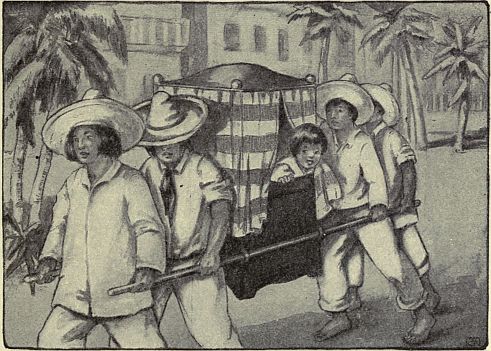
The chairs are large and have big, soft cushions. They have a cover overhead and curtains on all sides, and are carried by four men.
The two children ride in one chair; their mother in another. The curtains are drawn down, but Domingo peeps out as they ride through the city streets.
When they reach the cousin’s house they do not rap on the door or ring a bell. The mother claps her hands, and when the aunt sees them she says, “Enter and welcome. The house and all it contains is yours.”
Is not that a strange way of saying, “I am glad to see you. Will you come in?”
They sit in the parlor and while they talk they sip coffee from tiny cups. Before they come away they walk in the garden, where there are beautiful flowers and fountains, tall palm trees, and rubber trees with blossoms like yellow lilies.
The chair-men wait and the children ride home again, but it is dark, and they can see only the lights in the houses. The chair swings back and forth like a cradle as the men trot down the hill into the city.
They sing as they go, and the song is a low, sweet tune like a lullaby. Marikena puts her head on the cushions and almost falls asleep.
Domingo nods and dreams of the fruit and the flowers and the funny pet monkey his cousin had in the garden. Oh! the days are long and happy in Brazil, and the children have merry times.
“The Carnival, the Carnival,” shouted Domingo one morning. “This is the first day of the Carnival.”
Then he ran to find Marikena. “Look, Sister,” he cried, “I am a clown this year. What are you?”
“I am a fairy,” she replied. “See my cap and wand. And here is a bag full of sugarplums and sweetmeats. I can hang the bag over my shoulder.”
“See these big pockets,” said her brother. “They are bigger than a bag and they are just full of goodies. I like to be a clown, because I can have such big pockets. Take that!” and he threw a handful of sugarplums into her lap.
Just then there was a clapping of hands at the door and the children ran to the balcony.
In Brazil the Carnival is held on the three days![]() 40
40![]() before Lent, and every one has a holiday. The cities
are beautifully decorated, and men, women and
children wear odd costumes and masks.
before Lent, and every one has a holiday. The cities
are beautifully decorated, and men, women and
children wear odd costumes and masks.
Some of them are dressed to look like monkeys, some like parrots, and some like clowns. Some wear gay dresses and funny masks, and others wear ugly skins of animals and hideous masks.
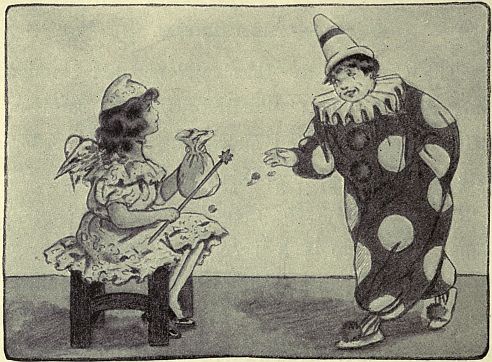
The children often carry wreaths and garlands of flowers; and there is always music and feasting and dancing in the streets.
Every one has pockets, bags, or baskets full of sugarplums, sweetmeats, bonbons and flowers.
These they throw at every one they meet, laughing merrily if they make a good hit.
The children think it is great fun to pelt each other with sugarplums and flowers. It is as good as snow-balling, only they can never have snow battles because they never have any snow.
The Carnival is the best time of all the year in Brazil, or at least Domingo and Marikena think so.
Where do Domingo and Marikena live?
When do they play out of doors?
What do they see in the woods?
How is the milk brought to their house?
When they go visiting, what do they ride in?
What did their aunt say when they went to call on her? What did they do at their aunt’s house?
What do some of the people wear on Carnival days?
What do they carry in their pockets? What do they throw at each other?
On the edge of the forest stood a tiny plant. It was only six inches tall.
The ground around it was so cold and hard that it could not grow taller. It had stood there many years, sad and sorrowful.
“Grow and be beautiful,” said the forest sternly, but the plant did not grow.
“Do you not wish to grow?” said the blue jay. Then he began to tell the little plant how lazy and useless it was. But his words went into one ear and out of the other.
Still the plant did not grow.
“Grow! grow!” roared the wind. “Grow tall and straight. I will teach you to obey. Grow! grow!”
Then the wind lashed the tiny plant with its cold wings, and beat its branches to the ground. But the poor thing came near dying and did not grow at all.
“Do grow,” said the sun. “Grow and be beautiful. I will help you.”
Then the sun warmed the earth around the plant, and gentle showers fell on it from the clouds.
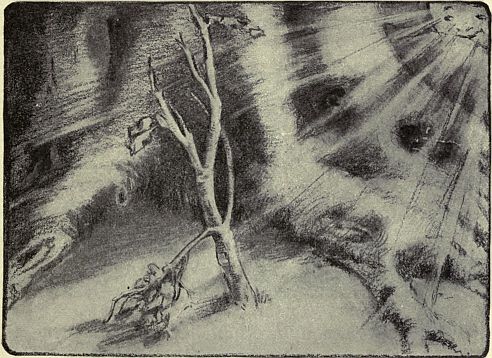
Now the little twigs began to grow, and the tiny plant became a beautiful birch tree, with green leaves and snow-white bark.
—Anna von Rydingsvärd.
Two little weeds grew on a bank by the roadside.
All summer they had been drinking the dew and sunshine, and had been very happy.
But now autumn had come, with gray skies and winds that nipped and pinched them.
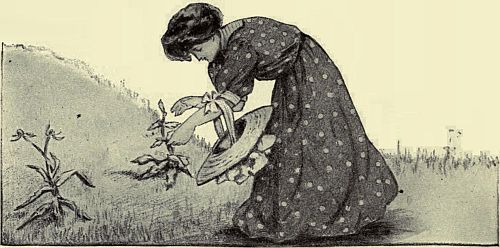
“We shall die soon,” said one little weed.
“I should like to do something pleasant before I die, just to show what a happy time I have had. I think I will turn red, and then people will see how I feel.”
“You will be very foolish to waste your strength
in any such nonsense!” said the other little weed.![]() 45
45![]() “I shall live as long as I can, and hug the brown
bank here.”
“I shall live as long as I can, and hug the brown
bank here.”
So the first little weed turned bright scarlet, and was so pretty that every one looked at it.
By and by there came down the road a most beautiful maiden.
When she saw the scarlet leaves she picked them and put them in her hair.
This made the little weed so happy that he died for pure joy.
The second little weed lived on, and turned slowly brown, like the bank.
“He was so foolish!” he said, speaking of the weed that turned scarlet. “He put all his strength into turning red, and so he died.”
“I was proud of him,” said the brown bank. “He did what he could, and people loved him.”
“Yes, but I am alive, and stay with you!” said the weed.
“Much I care!” said the bank.
—Laura E. Richards.
Little Me Too walked to the right, then to the left, along the sidewalk in front of the house.
As he walked he sang with all his might about the ocean, and the summer time, and any other pleasant thing that came into his head.
He made it up as he went along, and grew quite out of breath at last, and had to stop.
Just as he had got his breath and was meaning to begin all over again, he saw something very small and yellow on the edge of the walk.
Then he began to sing the song of whatever it might be that was so small and yellow.
This is what he sang:—
When he said “Yes!” he stooped down and dug a hole in the ground in the dooryard with his fingers.
Then he put the kernel of corn in the hole and covered it over with dirt.
Afterwards he stood up and sang at the top of his voice, “Now I guess it will grow!”
Of course it grew!
After a few days it poked itself up through the earth to make Little Me Too remember. For Little Me Too had forgotten all about it.
When he saw it poking its head up through the grass, he didn’t remember even then that it was the kernel of corn.
It had changed.
When he put it into the ground and covered it with dirt, it was yellow and hard.
Now it was green and soft. It looked somewhat like the rest of the grass,—but not just like it, or Little Me Too wouldn’t have noticed it.
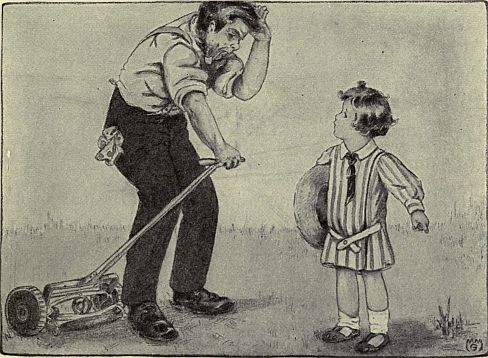
When he saw it he said, “There’s a grass that wants to be different. Perhaps it’s the grandfather grass.”
He let it alone, and he got the man with the lawn mower to let it alone. That gave it a good chance to grow.
It grew just as fast as it could, and as soon as it![]() 50
50![]() was big enough it showed Little Me Too that it was no
grandfather grass, but a cornstalk.
was big enough it showed Little Me Too that it was no
grandfather grass, but a cornstalk.
The man with the lawn mower said so.
Then it was that Little Me Too remembered. When he remembered, he said, “Yes, it grew.”
When it had grown to be taller than Little Me Too, people walking along the sidewalk would look at it, and say, “What a fine garden!”
The mother said, “I am glad it is something that can’t find its way into the nursery.”
Little Me Too it was who first saw the ear of corn growing on the stalk.
He showed it to some people, and there were others who saw it without having it shown to them.
Each of them asked for a bite from it when it should be ripe.
Little Me Too said “yes,” to them all.
When he had said “yes” to thirty-one people, his mother said, “Don’t say ‘yes’ to any more people; you won’t have corn enough for them all.”
Little Me Too promised not to say “yes” again,![]() 51
51![]() but sometimes he forgot, and by the time the corn
was ripe he had said “yes” to fifty people.
but sometimes he forgot, and by the time the corn
was ripe he had said “yes” to fifty people.
But he had plenty of corn, for it was an ear of pop corn.
After it was popped over the nursery fire it filled a big, big bowl.
—Julia Dalrymple.
Louis and Marie live among the mountains in Switzerland. These mountains are very high and are called the Swiss Alps.
The cold winds sweep down the mountain-side and rush through the valleys. Sometimes it blows so hard that it almost blows the thatched roofs off the houses.
But the mountain people know all about these strong winds. What do you suppose they do to keep the roof from blowing away? They lay heavy stones on the roof to keep it in place.
The winters are long and cold; and it snows and snows! You never saw such deep drifts nor such big fields of ice.
But the summer is beautiful,—the sky is blue and the sun is bright; and far away the mountain peaks are capped with glistening snow.
Then the grass is green and the flowers blossom everywhere. These are happy days for the children.
In summer Louis and Marie go out every morning with the goats. Marie is just a tiny bit of a girl only four years old, but Louis is a big boy. He is almost nine, and that is very old when one has such a little sister.
Louis lets the goats out of their yard. They jump and run and caper about, and Marie hides behind her mother’s dress. She is afraid of the goats at first.
One of the big goats always runs to the vineyard, he is so fond of grapes. Louis drives him out with a long stick.
Then the whole herd runs to the wheat field, and Louis runs after them, shouting at them and driving them away toward the mountain pasture.
Marie runs along with him and Patte Blanche goes, too. Patte Blanche is their dog, and his name means White Foot.
When the goats reach the pasture land they clamber over the rocks and eat the moss and the bushes and the sweet, green grass.
Louis and Marie pick the flowers that grow on the![]() 54
54![]() mountain-side, and play little games with the stones.
They watch the goats, too, and talk about them.
Sometimes a goat wanders too far away and then
Louis sends White Foot to drive her back to the others.
mountain-side, and play little games with the stones.
They watch the goats, too, and talk about them.
Sometimes a goat wanders too far away and then
Louis sends White Foot to drive her back to the others.
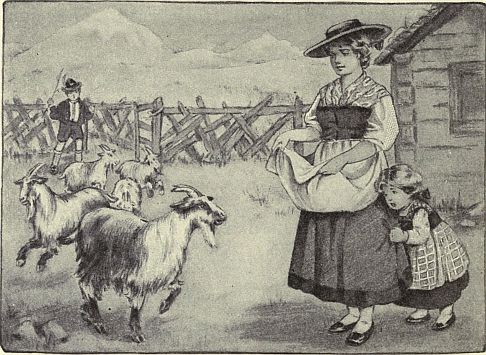
At noon the children eat their lunch of barley-bread and cheese, and White Foot sits beside them and eats the bits they give him.
There is always so much to do and so much to see
that the days seem very short. Soon it is time for![]() 55
55![]() White Foot to drive the goats down from the rocks
and the little company starts for home.
White Foot to drive the goats down from the rocks
and the little company starts for home.
One night a very funny thing happened when they were on their way home.
The goats were wandering along, nibbling at the green grass, and the children were following them down the path, when they saw a strange man sitting on a log. The man was fast asleep and his head nodded and bobbed up and down.
Just as Louis saw him, one of the goats spied him, too, and what do you think she did? She trotted along, ran up behind him and butted him right off the log. Of course the man waked up and I think he was going to be very angry, but the goat put her fore feet up on the log and looked as if she wanted to laugh.
The children laughed, and so the man laughed, too. Then he walked home with them and helped them drive the goats into their yard.
Louis and Marie will never forget how funny the goat looked trying to laugh at the man, and they like to tell the story over and over again.
You have just read a story about Louis and Marie, who live among the mountains of Switzerland.
Switzerland is a land of mountains and valleys and many beautiful lakes and rivers.
Most of the people live in the valleys and keep cattle, sheep, and goats.
In the springtime thousands of cattle are driven up into the mountains to stay all summer.
Many of the people go up into the mountains, too, and live in little huts. The men and boys take care of the cattle, and the women make butter and cheese.
The cows wear bells which tinkle as they walk, and the music of all the bells, in the stillness of the mountains, is very beautiful.
In the fall the men drive the cattle down into the
valleys again. When they reach the villages their
friends come out to meet them, and every one has a
holiday. The children think this is one of the best
days in all the year. They like to hear the bells ring![]() 57
57![]() out their welcome; they like to see the flags and
banners waving from the windows and the house-tops.
They sing and dance and shout and are very
merry.
out their welcome; they like to see the flags and
banners waving from the windows and the house-tops.
They sing and dance and shout and are very
merry.
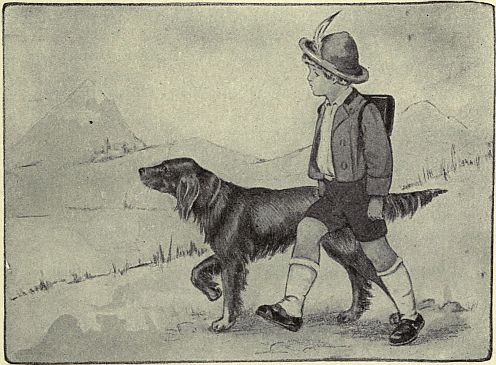
At night there is a feast in the village square, and perhaps they like this best of all.
Many of the houses in Switzerland are very small and are made of wood. These little houses are called chalets.
Louis and Marie live in a tiny chalet on the side of a steep mountain. Their father owns a farm and has cows and sheep and goats, and ever so many geese.
You never saw such a farm in all your life. The mountain is so steep that the fields and pastures seem to be tipped up on edge, and it looks as if the horses would fall off when the farmer is plowing the fields, but they never do.
Louis has a pet dog. He harnesses his dog to a little wagon and drives him up and down the road. Sometimes he gives Marie a ride in the wagon.
Louis goes to the village school, and Marie will have to go as soon as she is six years old. There are very good schools in Switzerland, and the children learn the same things that you learn in your school.
These children have many odd playthings and toys carved out of wood. They have wooden whistles and horns, and little wooden goats and bears. Marie has a tiny chalet, almost like the one she lives in, which she calls her “playhouse.”
The toys the children like best are the ones that have a music box in them. The Swiss people make all kinds of music boxes and put them in all kinds of things, in chairs and tables and clocks, and even in plates.
While the boys are learning to carve, the girls learn to embroider on linen and to make lace.
Very often the Swiss girls sit outside the door of their chalet making lace which they sell to the people who are travelling through the mountains.
Where do Louis and Marie live?
What does their father do?
Where do the cattle live in the summer?
Who takes care of them?
What do the women make, up in the mountains?
Which holiday do the Swiss children like best?
What do they do on this day?
What is a Swiss cottage called?
Why do people like to travel in Switzerland?
If you should go there, what would you like to see?
What would you like to buy?
“Why is your little sister crying, dear?” asked the Play Angel. “I thought you were taking care of her.”
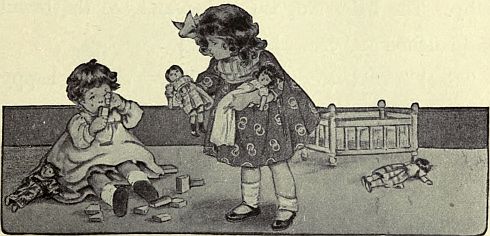
“So I am, taking beautiful care of her,” said the child. “But the more beautiful care I take, the more she cries. She does not like to have me take care of her.”
“Let me see,” said the Play Angel, and she sat down on the nursery floor. “Now show me what you have been doing.”
“Look,” said the child. “First I showed her all![]() 62
62![]() my dolls, and then all my dolls’ dresses. Now I have
given her my new stone blocks to play with, but she
will not play with them. She puts them in her mouth
and cries.”
my dolls, and then all my dolls’ dresses. Now I have
given her my new stone blocks to play with, but she
will not play with them. She puts them in her mouth
and cries.”
“Perhaps she is hungry!” said the Play Angel.
So she took a piece of bread and gave it to the baby. The baby stopped crying and ate the bread, and laughed and crowed.
“See!” said the Angel. “Now she is happy. Remember, dear, that when babies are hungry, stone blocks do them no good.”
“You are a very clever angel to know that,” said the child.
“You are a rather foolish child,” said the Angel, “or you would have found it out for yourself.”
—Laura E. Richards.
Betty and Percy sat up until eleven o’clock that Christmas Eve. It was such a merry time!
They saw the men bring in the Yule log. It was so big that it took three men to carry it, and then they had to bring it in on their shoulders.
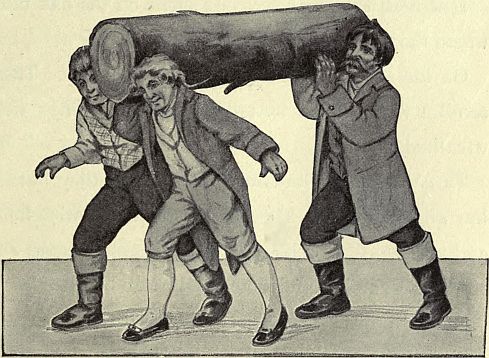
At one end of the hall was a large fireplace. I think
you never saw one like it. Pots and kettles hung![]() 64
64![]() over the fire, and on each side were seats where the
children could sit and eat apples and tell stories. You
see, it was a very big fireplace.
over the fire, and on each side were seats where the
children could sit and eat apples and tell stories. You
see, it was a very big fireplace.
The men rolled the Yule log into the fireplace and lighted the fire. How the sparks flew! How the fire roared up the chimney!
It lighted the great hall. It shone on the oak table where the supper was laid.
On the supper table were two wax candles. These candles were almost as tall as you are. They were wreathed with holly.
These were the Christmas candles and they burned the whole evening. The hall was trimmed with holly and mistletoe. The holly had bright green leaves and red berries, and the mistletoe had white berries.
A big bunch of mistletoe hung down from the ceiling before the fire. If anyone happened to stand under the mistletoe, she was kissed.
How many times Betty was kissed! First her father caught her under the mistletoe, then Uncle Edward, and then Grandpa.
At eleven o’clock Nurse said that Betty and Percy must go to bed. They did not like to go one bit.
There was a fire in the fireplace in Betty’s bedroom, but it was very cold. In Great-Great-Grandma’s time there were no such things as stoves and furnaces.
Nurse undressed Betty, and then the little girl climbed up the steps into her bed. It was so big and high that she had to climb up five steps to get into it.
Then Nurse drew the curtains of the bed to keep out the cold.
Betty was almost asleep when she heard the Waits singing. The Waits always sang under the windows on Christmas Eve.
“Open the lattice, please, Nurse,” she said.
So Nurse opened one of the windows. It opened like a door, and had panes of glass which were small and diamond-shaped.
The house Betty lived in was very, very large, and was called a castle.
This is what the Waits were singing:—
Betty did not hear the next verse, because her eyes were shut and she was fast asleep.
When she waked up in the morning, the first thing she heard was another Christmas carol.
She slid down the side of the bed and ran to the window.
It was a lovely Christmas morning. The trees and ground and walks were covered with snow. How it glistened in the sunshine!
The singers were standing in a row under the window. There were seven of them, and they were all children from the village whom Betty had seen when she was driving with her mother.
How they were bundled up, and their cheeks were as red as roses!
They were singing this Christmas carol:—
“Quick, quick, Nurse,” said Betty. “Please dress me as quickly as you can. I must run down with the Christmas boxes.”
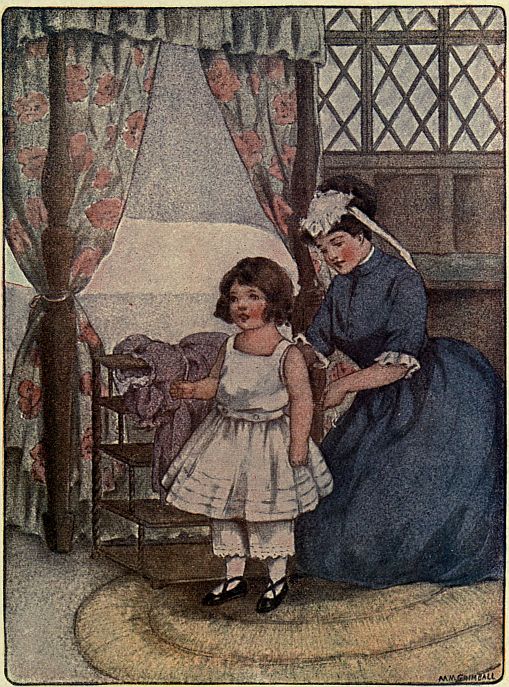
So Nurse hurried, and Betty hurried, and in a little while she was ready, with a sprig of holly in her dress, and a bit of mistletoe in her hair.
Percy was ready, too, and they ran down the long staircase into the wide hall.
The Yule log was still burning,—it had burned all night. The door was opened, and the little singers came in to warm themselves by the fire.
Betty and Percy gave each of them a “Christmas box.” It wasn’t a box, it was a gift; but a Christmas gift was called a Christmas box in those days.
After the singers had looked at their gifts and had eaten a slice of plum cake, they went home.
I cannot tell you everything that Betty and Percy did that day, but you may be sure they had a good time.
I must tell you about the Christmas dinner. It was served in the hall, on the big oak table that stood before the fire.
When dinner was ready they did not ring a bell, but the cook knocked three times with his rolling-pin on the door.
Two men stood in the hall, and when they heard the three knocks they sounded their trumpets, the doors were opened, and all the family marched in to dinner.
I do not know just what they had to eat, but I know they had roast goose, and a plum pudding just as you do at Christmas time.
After dinner the children played games. And what do you think they played? First they played “Puss-puss-in-the-corner,” and then “Blind-man’s-buff.”
Isn’t it strange that Great-Great-Grandma should have played the very games you play, on that Christmas night more than two hundred years ago?
Many years ago there was a little boy living in England whose name was Edward. Of course there have been many boys in England by the name of Edward, but they are not so well known as this boy, for he was the son of a king.
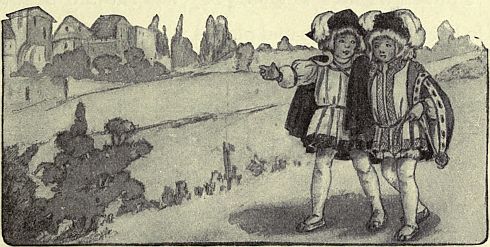
Edward’s father was King Henry the Eighth, and Edward was called Edward the Sixth when he became King of England.
King Henry was very fond of his children and did not like to have them punished, so he had a little “whipping boy” for each one of them.
Whenever one of the Princes or Princesses did anything naughty, the whipping boy was punished.
Sometimes he had to stand in the corner for a whole hour. Sometimes he was sent to bed without any supper, and sometimes he had to have a whipping.
Prince Edward’s whipping boy was Edward Brown. He lived in the castle and played with the Prince every day. The two boys were very fond of each other, and the Prince did not like to have his friend punished.
So he tried to be good, but there are so many things a Prince must not do!
A Prince must not throw his toys out of the castle window. He must never get angry at his brothers and sisters and quarrel with them. He must learn his lessons every day.
He must be polite and obedient to the King and Queen, to all the Gentlemen in Waiting and Ladies in Waiting, to the Head Nurse and all the Under Nurses, and to his Tutor and all his teachers.
Oh! it is very hard to be a good Prince!
Sometimes Edward Brown had to be punished![]() 71
71![]() more than once while the boys were at play, and
sometimes Prince Edward was quite good all day
long.
more than once while the boys were at play, and
sometimes Prince Edward was quite good all day
long.
One day the Prince did something that was very wrong; and when his Tutor would have punished the whipping boy, Edward took the cane from his hand and said, “Sir, you shall whip me for this. It is my command. I did wrong. I should be punished.”
When Prince Edward was nine years old, his father died, and the Prince was made King of England.
Perhaps you would like to know how he was dressed when he went to be crowned. He wore a suit of white velvet, embroidered with diamonds, pearls, and rubies. His cap was white velvet, and his coat was cloth of silver.
He rode on a white horse through the city and the people shouted, “Long live King Edward.”
Among the tall trees in the forest grew a little spruce tree. It was no taller than a man, and that is very short for a tree.
The other trees near it grew so tall and had such large branches that the poor little tree could not grow at all.
She liked to listen when the other trees were talking, but it often made her sad.
“I am king of the forest,” said the oak. “Look at my huge trunk and my branches. How they reach up toward heaven! I furnish planks for men from which they build their ships. Then I defy the storm on the ocean as I did the thunder in the forest.”
“And I go with you over the foaming waves,” said the tall straight pine. “I hold up the flapping sails when the ships fly over the ocean.”
“And we warm the houses when winter comes and the cold north wind drives the snow before him,” said the birches.
“We have the same work to do,” said a tall fir tree, and she bowed gracefully, drooping her branches toward the ground.
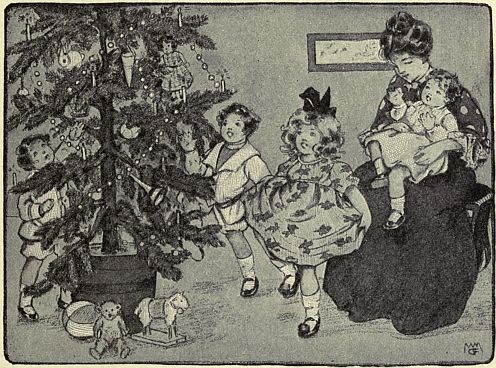
The little spruce tree heard the other trees talking about their work in the world. This made her sad, and she thought, “What work can I do? What will become of me?”
But she could not think of any way in which she could be useful. She decided to ask the other trees in the forest.
So she asked the oak, the pine and the fir, but they were so proud and stately they did not even hear her.
Then she asked the beautiful white birch that stood near by. “You have no work to do,” said the birch, “because you can never grow large enough. Perhaps you might be a Christmas tree, but that is all.”
“What is a Christmas tree?” asked the little spruce.
“I do not know exactly,” replied the birch. “Sometimes when the days are short and cold, and the ground is covered with snow, men come out here into the forest. They look at all the little spruce trees and choose the prettiest, saying, ‘This will do for a Christmas tree.’
“Then they chop it down and carry it away. What they do with it I cannot tell.”
The little spruce asked the rabbit that hopped over the snow, the owls that slept in the pines, and the squirrels that came to find nuts and acorns.
But no one knew more than the birch tree. No one could tell what men did with the Christmas trees.
Then the little spruce tree wept because she had no work to do and could not be of any use in the world.
The tears hardened into clear, round drops, which we call gum.
At last a boy came into the forest with an axe in his hand. He looked the little tree all over. “Perhaps this will do for a Christmas tree,” he said. So he chopped it down, laid it on a sled, and dragged it home.
The next day the boy sold the tree, and it was taken into a large room and dressed up with pop corn and gilded nuts and candles. Packages of all sizes and shapes, and tiny bags filled with candy, were tied on its branches.
The tree was trembling with the excitement, but she stood as still as she could. “What if I should drop some of this fruit,” she thought.
When it began to grow dark, every one left the room and the tree was alone. It began to feel lonely and to think sad thoughts.
Soon the door opened and a lady came in. She lighted all the candles.
How light and glowing it was then!
The tree had never even dreamed of anything so beautiful!
Then the children came and danced about the tree, singing a Christmas song. The father played on his violin, and the baby sat in her mother’s arms, smiling and cooing.
“Now I know what I was made for,” thought the spruce tree; “I was intended to give joy to the little ones, because I, myself, am so small and humble.”
—Anna von Rydingsvärd.
It was the Eve of St. Nicholas. In Germany St. Nicholas’s Day comes on the sixth of December.
The children were in the nursery. On the hearth before the fireplace, were five little sugar shoes.
Thekla was filling her shoe with oats. Max put rye in his shoe. Hans put an apple in his, and Gretchen filled hers with lumps of sugar.
Betty, the poor little girl who sometimes helped in the kitchen, had only a bit of brown bread to put in her shoe.
The children were expecting St. Nicholas, who always comes on a white horse, and the things in the shoes were for the horse to eat.
As the clock struck six there was a loud knock at the door.
Aunt Hilda opened the door, and in came St. Nicholas. He was very tall and had a long white beard. He wore a long black robe and a red and white cap, with a big red tassel.
“Dear little children,” he said, “it will soon be Christmas. I have come to find the good children. I shall bring gifts to them on Christmas Eve. Has Thekla learned to knit?”
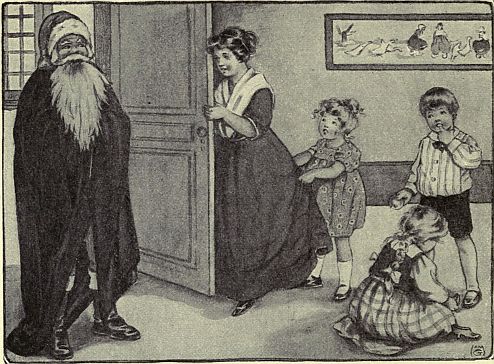
“Yes, indeed,” said her mother. “See this pair of stockings she has knit for Hans.”
“They are very well made,” said St. Nicholas. “I shall surely bring a gift for Thekla. Has Hans learned to get up early?”
“We have not had to call him for six weeks,” said his father.
“Good,” said St. Nicholas. “Has Max learned his multiplication tables?”
“Max is trying very hard,” said Aunt Hilda. “He knows all but the nines and twelves.”
“And the dear little Gretchen?” said St. Nicholas, patting the baby’s golden curls.
They all smiled, and the mother said, “The dear little Gretchen is always sweet and good.”
“Well, well, I shall certainly bring many beautiful gifts to this house,” said St. Nicholas.
“And don’t forget little Betty,” said Aunt Hilda.
So the good Saint took the oats, the rye and the apple, the lumps of sugar, and the bit of brown bread out of the sugar shoes and went out into the night. I suppose he gave them to his horse.
“St. Nicholas has eyes like Uncle Max,” said Thekla.
“He smiled like Uncle Max, too,” said her brother.
St. Nicholas kept his word. On Christmas Eve there was a Christmas tree in the parlor. On it there were many beautiful gifts, and little Betty was not forgotten.
The next night the children hung gifts on the same tree for father, mother, Uncle Max, Aunt Hilda, and the dear Grandfather.
Each one of the children had something of his very own for Grandfather.
Thekla had knit a warm scarf for him. Max can carve in wood, so he had made a stout cane and had carved it very handsomely.
Hans drew a picture for him, and the dear little Gretchen gave him two of her very best kisses.
Oh, it was a very happy Christmas!
The “little Turkeys” that I am going to tell you about are the children that live in a far away land called Turkey.
To reach this land you would have to travel many hundreds of miles in railroad trains and big ships.
In fact it is almost as far away as China, and that, you know, is farther away than you can imagine.
The “little Turkeys” are very interesting, and they would think your way of living just as strange as you will think theirs is.
To begin at the very beginning, the tiny baby doesn’t wear any dresses. He is wrapped round and round, body, legs, and arms, with cloths, until he looks like a dry-goods bundle.
Every baby wears a gay little bonnet, usually bright green, because the favorite color of the Turks is green.
The Turkish baby is often hung up in a little cloth![]() 84
84![]() hammock, but sometimes he is rocked to sleep in a
wooden cradle.
hammock, but sometimes he is rocked to sleep in a
wooden cradle.
The cradle is a long wooden box on low rockers with high carved ends.
In the Sultan’s treasure house is a cradle of solid gold, decorated with pearls, diamonds, and rubies. This is the cradle in which the baby princes are rocked; and it is very beautiful, as you can easily imagine.
When the boy baby is about a year old he is placed in charge of a man nurse, if the father is not too poor. This man takes care of him until he is six years old.
Then the boy is given a new suit of clothes and a pony, and he is ready to go to school. Almost all of the boys in Turkey ride on horse-back. I think you would like that.
The new suit may be big baggy trousers, with an embroidered shirt and short jacket. Or it may be long full trousers of gay striped calico, and a little jacket, quilted in puffy squares.
Every boy wears on his head a red fez with a black tassel.
In his new suit, the boy starts off for school on his pony, and his brothers go with him. The bells on the pony jingle, the boys shout and sing, and it is a very merry procession.
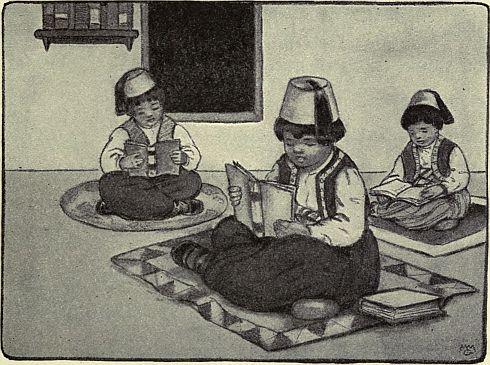
The schoolhouse stands near the church. Inside, it is very plain. There is a blackboard hung from the ceiling, a shelf for books and slates, and one for a water jar.
There is a little shelf for the teacher’s pipe, and a
place where he makes coffee over a tiny lamp. For![]() 86
86![]() the teacher smokes and sips coffee while the children
study their lessons.
the teacher smokes and sips coffee while the children
study their lessons.
The children sit cross-legged on mats on the floor, and study out loud, bending their bodies back and forth all the time. Perhaps they think this helps them to remember.
They learn their letters, and very queer letters you would think them, out of the Koran. They have no other book until they know this one by heart, and can repeat it and write it.
Then they learn a little arithmetic and a very little geography.
In olden times the girls did not go to school at all, but stayed at home learning to keep house, sew, and embroider. They were also taught to weave cloth and to make beautiful rugs.
Now there are many schools for girls, as well as high schools and colleges for both girls and boys.
The noise of the studying is stopped once during
the day. At noon the time for prayer is called out
from the tower of the church. Then all is quiet for![]() 87
87![]() a few minutes while teacher and pupils kneel to say
the midday prayer.
a few minutes while teacher and pupils kneel to say
the midday prayer.
Then the candy-man appears with all sorts of sweets on trays. The candies are called “Turkish delights.” They are “pasty, creamy, crackly things, made from rose-leaves, violets, nuts, dates and grapes, mixed with honey, sugar, syrup and spices.”
Doesn’t that sound good enough to eat?
Where do the “little Turkeys” live?
How would you reach their country?
Describe the Turkish baby’s cradle.
Describe the princes’ cradle.
How does the Turkish boy go to school?
Tell what you can about the school.
What does the candy-man sell?
What are the candies made of, and what are they called?
Little boys who like to lie in bed in the morning would not like to live in Turkey.
All the grown people and all the children have to get up twice every day.
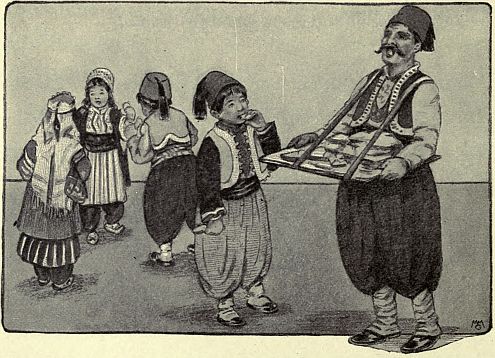
They get up first at day-break, wash their faces and hands, and repeat their morning prayer. Then they go back to bed.
Two hours later they rise, wash, and have their coffee. Breakfast is served two hours later still.
After breakfast the father goes to work and the mother gets the children ready for school.
The children have their lunch at school, as I told you. Dinner is served at night. If there are gentlemen to dine with the father, only the sons sit at the table. The mother and daughters dine in another room.
After dinner every one has a good time. The children play games, and sometimes the older people play with them. They are also fond of story telling, and tell wonderful stories of battle and adventure.
Then the family goes to bed on the floor. That is, they lay mattresses on the floor and cover themselves with blankets.
Every one goes to church on Friday. The boys sit with their father, and the girls sit with their mother in a gallery where they cannot be seen. At the entrance to the church they wash their hands and feet and put on a pair of slippers.
After church the children play games of tag, or![]() 90
90![]() hide-and-seek. They have few toys. The girls have
dolls, and the boys have marbles or balls. The
marbles are nothing but a kind of round nut.
hide-and-seek. They have few toys. The girls have
dolls, and the boys have marbles or balls. The
marbles are nothing but a kind of round nut.
They do not have the holidays you do, but there are a few feast days, when they have a very good time. One of the feasts is like our Easter, only it lasts three days. Then there are merry-go-rounds in the squares, and ponies to ride on for a penny.
The girls have new dresses of red, blue and yellow silk, and the boys have gay little uniforms.
The candy-men walk the streets with big trays piled high with sweets, and every one eats a great deal too much candy.
Should you like to live in Turkey, or do you like your own country best?
Tell what the “Little Turkeys” do in the morning.
What do the children do after dinner?
What toys do they have? What games do they play?
Where do the Turkish people sleep?
Would you like to live in Turkey? Why?
“Why do you play alone, dear,” asked the Play Angel, “and look so sadly over your shoulder at the other children?”
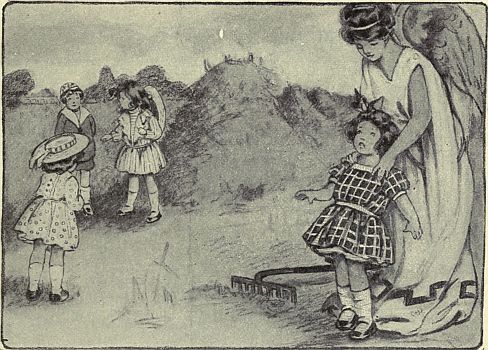
“Because they are so selfish!” said the child. “They will not play with me.”
“Oh, what a pity!” said the Angel. “Tell me all about it.”
“I want to play one game, and they all want to![]() 92
92![]() play another!” said the child. “It is very unkind of
them.”
play another!” said the child. “It is very unkind of
them.”
“Did you ever play Gillyflower Gentleman?” asked the Angel.
“No,” said the child. “What is it?”
“You shall see,” said the Angel. “Let us ask the others if they know it.”
The other children did not know it, but they were eager to learn, and soon they were all playing Gillyflower Gentleman. They played till all their breath was gone, and they had to sit down on the haycocks to rest.
“That was a fine game!” said the first child. “I will play yours now, if you wish me to.”
“We were just going to tell you that we would play yours,” said the other children. So they played both the games, and the Play Angel went back to her work.
—Laura E. Richards.
It was time for the Child to have lessons. The father gave him a sheet of paper, smooth and white; a pencil, and a ruler.
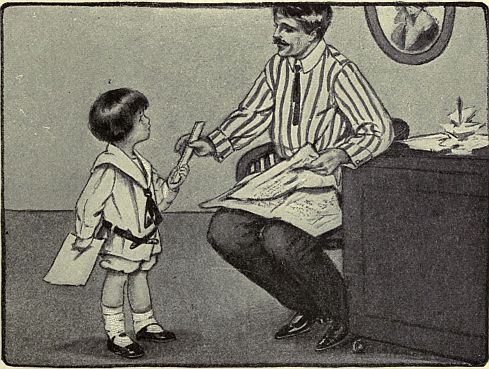
“Write as well as you can,” he said, “and be sure you keep the lines straight!”
The Child admired the ruler very much. “I will![]() 94
94![]() put it up on the wall,” he said, “where I can see it
always.”
put it up on the wall,” he said, “where I can see it
always.”
So he put it up on the wall, and the sunbeams sparkled on it.
“It must be pure gold,” said the Child; “there is nothing else so beautiful in the world.” And then he began his task.
By and by the lesson time was over, and the father came to see what had been done.
The Child showed him the paper on which he had written his task. Up and down went the lines, here and there, from side to side of the sheet, which was covered with sprawling, straggling letters. There were spots, too, where he had tried to rub out something. It was not a pretty page.
“What is this?” asked the father. “Where is your ruler?”
“There it is,” said the Child. “It is up on the wall. It was so beautiful that I put it up there where I could see it all the time. See where it hangs! But it does not seem as bright as it was.”
“No,” said the father. “It would have been brighter if you had used it.”
“But I admired it very much,” said the Child.
“But your lines are crooked,” said the father.
—Laura E. Richards (Adapted).
When you were a very little boy did you have a “Noah’s Ark” for a plaything? And do you remember the story of “Noah and his Ark?”
This story tells, you remember, about a severe storm, when it rained forty days and forty nights and all the land was flooded.
But Noah had built an ark and invited two animals of every kind, and a few persons, to live in his ark during the flood.
When the storms were over, the ark rested on a mountain, and this was Mount Ararat.
Mount Ararat is in the country of Armenia, and in this country lives a very interesting people.
Armenia is a mountainous country and Mount Ararat is the highest of all the mountains. It is so high that it has a snow cap all the year round, even during the hottest part of the summer.
The Armenian children are often very pretty, with
black hair, black eyes, and round, red cheeks. They![]() 97
97![]() are bright and anxious to learn, and they often ride a
long way on donkey-back to get to the church schools.
are bright and anxious to learn, and they often ride a
long way on donkey-back to get to the church schools.
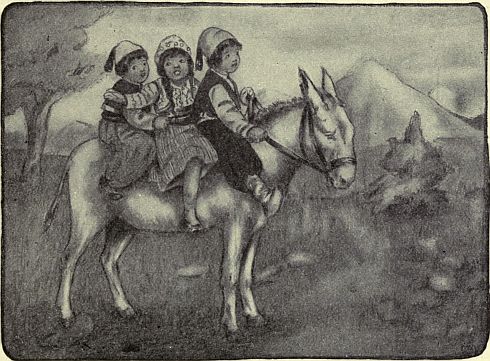
The schools are not free like the school you go to, and often the parents have to pay the school with grain and cheese because they have no money.
There is a free school near every church, and the priest is the teacher. Here the little boys and girls learn the Armenian alphabet, and also study reading, writing, geography, and grammar.
The mirigs (mothers) of the little Armenians have to wake them very early, for they have to go to school at seven.
They sit cross-legged on the floor, and study their lessons aloud. All the children carry a lunch from home, and they eat together in another little room, still sitting on the floor.
Boys and girls go to the same school until they are ten or twelve years old; then the girls go to a different school. Here they learn dressmaking and embroidery. The materials are supplied by the school, and at the end of the year the articles are sold and the money goes to the school.
The boys do not earn money for the school, but they have to sing in the church on Sunday.
When school closes at night the children form in line, with their hands folded, and march to their homes. The line stops at each house where a child lives, while the little one bids his friends good-night.
In winter there are deep snows, and then Hagop![]() 99
99![]() (Jacob) and Garabet (George) and the other boys
build snowmen and have snowball battles.
(Jacob) and Garabet (George) and the other boys
build snowmen and have snowball battles.
But in summer they work more than they play, for they have to go up to the mountains with herds of goats. A few women go to cook for them, and they all live in huts built of boughs.
The girls have rag dolls, with painted eyes, nose and mouth, and very red cheeks. These dolls are dressed just like the little girls, with gaily colored dresses of red, green, purple, or yellow. Their hair is braided in long braids, and strung with beads and coins.
Where is Mount Ararat?
Tell the story of Noah and his Ark.
What is the highest mountain in Armenia?
What covers the top of this mountain?
What is the Armenian word for “mamma?”
What do the children learn in the church schools?
How do the children go home from school?
What do the boys do in winter? In summer?
Hagop and Garabet live at the foot of Mount Ararat in a small village.
Their father is very poor and cannot afford to build a house, so they live in a hut, built of mud, with walls three feet thick.
The inside of the house is plastered with chopped straw and mud mixed together. The mud roof is flat and is kept smooth by rolling it often with a stone, or treading it with bare feet. Hagop and Garabet think it is great fun to go up on the roof after it rains and tread the soft mud with their bare feet. Then their father rolls it with a big round stone until it is smooth and firm.
There are many huts like this in Armenia, and they are often half under ground, with the earth that has been dug out piled up around them. A village of such dwellings looks a good deal like a village of huge ant-hills.
There is only one door for the people and animals.![]() 101
101![]() Animals? Yes, animals. For in winter the poor
people let the animals come into the room with them,
and almost every family has at least a few goats.
Animals? Yes, animals. For in winter the poor
people let the animals come into the room with them,
and almost every family has at least a few goats.
There is a fireplace in the middle of the earth floor for cooking, but there is no chimney, and the room is very smoky.
The mother makes big thin sheets of blanket bread and bakes it before the fire. Sometimes she makes little cakes of the bread and spreads them with thick cream.
The children drink goats’ milk with their bread, and once in a long while they have a few raisins.
There are no windows in the hut, instead there are a few holes for light; and there are no tables, no chairs, no beds, no bureaus. In fact there is no furniture except some mats and blankets. Hagop’s mother weaves the mats and blankets herself. The children like to watch the patterns grow on the rugs as the mother weaves the colored threads back and forth.
The people sit on the mats in the daytime and at![]() 102
102![]() night they roll themselves in the blankets and sleep on
these same mats.
night they roll themselves in the blankets and sleep on
these same mats.
Of course the rich people in the towns and cities have much more comfortable houses, and they often have beautiful carved furniture and handsome rugs. But these houses have flat roofs, too, and in summer every one, rich or poor, lives on the roofs.
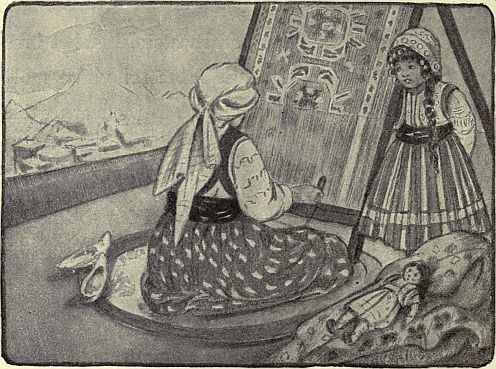
There all the work is done; the women weave rugs![]() 103
103![]() or make beautiful lace; the little girls play with their
dolls; and at night the mats are spread and the family
sleep under the stars.
or make beautiful lace; the little girls play with their
dolls; and at night the mats are spread and the family
sleep under the stars.
I do not believe I should like to live in Armenia, but I should enjoy sleeping out of doors on the warm summer nights, watching the twinkling stars until I fell asleep.
Describe the house where Hagop and Garabet live.
What does a village of these huts look like?
Where do the goats live?
What makes the house smoky?
What do the children have to eat and drink?
Describe the inside of the house where Hagop and Garabet live.
Where do the people live in the summer time?
Where do they sleep in summer? In winter?
Tell all the things you can that Hagop’s mother has to do.
Little Ahmow was an Eskimo boy. He lived with his parents on the bleak northern shore of Hudson Bay.
During the long Arctic winter these Eskimos kill the walrus which live at the edge of the ice. In the short summer they hunt them on the islands near the shore.
The walrus meat is cut into strips and sewed up in bags made of the walrus skin. This is to keep the dogs from stealing and eating it.
The walrus oil is put into casks to be used in the dark winter months for heat and light.
Ahmow’s father killed many walrus every summer and stored the meat and oil on the islands. Then in the winter he rode over on the ice to get it.
One cold winter day, when Ahmow was ten years old, his father said, “To-morrow I shall go to the island for oil.”
“We need meat, too,” said his wife, “and food for the dogs.”
“May I go with you, father?” said Ahmow. “I will help you all I can.”
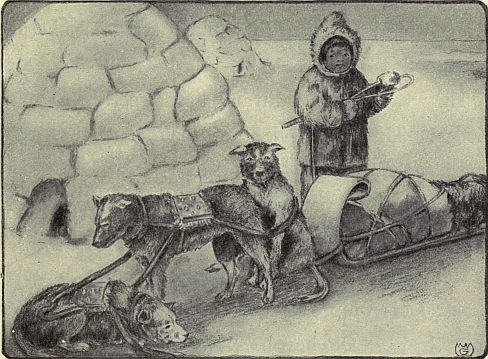
“No,” answered Nannook. “It is far and you are only a boy.”
Ahmow begged so hard that at last his father said he might go.
“But it will be a long cold ride, and there are often bears and wolves on the island.”
So Ahmow dressed himself in his new reindeer suit that his mother had made, and pulled his sealskin cap well over his ears.
He helped his father get ready for the long, cold journey. First they put a thick coating of ice on the sledge-runners. Then they filled two sealskin bags with food and water.
They called the dogs and harnessed them to the sledge. There were eight of them, and they could run like the wind.
Last of all Ahmow crawled into the house, bade his mother good-by, and brought out the long whip.
Nannook wrapped his little boy in a bearskin, cracked his whip over the dogs, and away they flew over the ice. Oh, how happy Ahmow was!
After a while the dogs stopped running and began to trot, and Ahmow looked about over the vast fields of ice.
Not a tree, not a house, not a person was in sight.![]() 109
109![]() As far as he could see there was nothing but ice and
snow. Everything was still and white in the dim light.
As far as he could see there was nothing but ice and
snow. Everything was still and white in the dim light.
When they had nearly reached the island, what did they see but a huge polar bear! He was prowling around the oil casks, looking for something to eat.
Nannook unharnessed the dogs at once. “Go,” he cried, and they raced across the ice after the bear.
The bear was so big and clumsy that he could not run fast. The dogs soon surrounded him, and held him until Nannook came running up to shoot him.
Ahmow helped his father skin the bear and cut up the meat. Then they loaded the sledge with a cask of oil, some walrus meat, the bearskin, and part of the bear meat.
After eating their luncheon, Ahmow was again rolled up in the bear rug, and they started for home. Nannook walked beside the sledge. The dogs walked too, because the load was so heavy.
When they were nearly halfway home, Nannook saw some reindeer.
“Watch the dogs, Ahmow,” he said, “and I will![]() 110
110![]() try to shoot one of those reindeer. Then we can have
a fine dinner.”
try to shoot one of those reindeer. Then we can have
a fine dinner.”
So he took the gun and ran swiftly over the snow. Soon he was out of sight, and Ahmow was alone with the dogs.
The little boy played with the dogs at first, but after a while they curled up and went to sleep.
Ahmow was sleepy, too, and it was so warm in the bear rug that he almost went to sleep.
All at once he heard a growl, then a dog barked. Ahmow was wide awake and listening. “What is it, Naka?” he said to the dog that barked.
Naka barked again, and the hair stood up straight on his back.
Ahmow stood up and looked about. There was a fierce, hungry-looking wolf coming toward him! He looked again! One, two, three, four wolves were leaping over the snow!
The boy threw off the rug, and seized his father’s whip and walrus spear. “Come here,” he called to the dogs. “Come here to the sledge.”
Then, as the wolves came nearer, he jumped into the cask of meat.
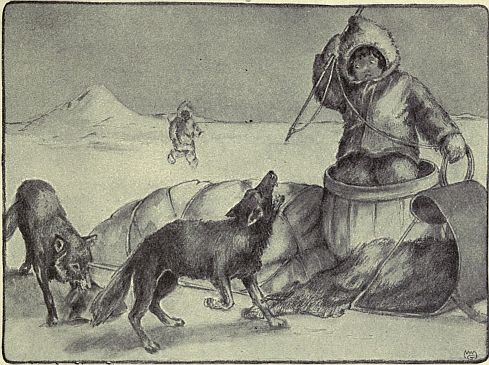
One big wolf ran up to the sledge. Ahmow leaned over and struck him with the whip with all his might. The wolf howled and turned back.
Another wolf would have killed one of the dogs, but Ahmow threw out a big piece of bear meat. The wolf seized the meat and began to eat it.
Now a third wolf came up to the sledge. Just then Ahmow saw his father running toward him.
“He will drive the wolves away,” he thought, “but I should like to kill one if I can.”
So he held the spear as he had seen his father hold it. As the wolf came nearer, he raised it. As the wolf jumped, he threw it with all his might right into the wide-open mouth. There was a howl, a growl, and then the wolf tried to run away. But Ahmow wound the spear line around the sledge post and held it tight.
Nannook shot two of the wolves, but the one that had the meat got away with it.
Then as he ran to the sledge, “Look, father,” cried Ahmow. “See this fine wolf, with the sharp nose, and the bushy tail. He is held fast with the walrus line, and he has eaten the walrus spear.”
“Well done, lad,” said his father. “You will be a good hunter. Now, you shall have a spear of your own and you shall go with me on the big hunts.”
So from that day the boy was a hunter, and the people in the village called him “Ahmow,” which means, “little wolf.”
—Frederick Schwatka.
The Eskimos live in Greenland. I am sure you would wonder why it is called “Greenland,” for it is almost never “green.” Nearly all the year round the ground is covered with ice and snow, so that it seems as if “Whiteland” would be a better name.
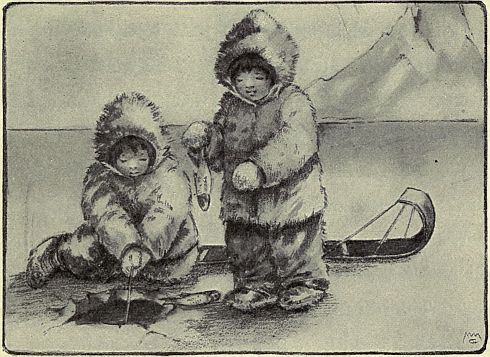
It is so cold in Greenland that the Eskimos have
to wear very warm clothing. The boys and girls![]() 114
114![]() and men and women dress very much alike. They
wear trousers made of bearskin and coats made of
sealskin. Their stockings are like leggings and are
made of birdskin, with soft feathers inside to keep
their feet warm. Over these they wear sealskin
boots, which are long enough to cover their knees.
and men and women dress very much alike. They
wear trousers made of bearskin and coats made of
sealskin. Their stockings are like leggings and are
made of birdskin, with soft feathers inside to keep
their feet warm. Over these they wear sealskin
boots, which are long enough to cover their knees.
It is so cold in Greenland that trees cannot grow. If you think of all the ways in which we use the wood from our forest trees you will wonder what the Eskimos can do without them.
We build houses of wood, but the Eskimos make theirs of blocks of ice and snow.
We burn wood in our stoves. The Eskimos burn oil and fat which they get from the walrus and the seal. They burn this oil in a lamp which gives them all the light and heat they have.
Our beds, chairs and tables are made of wood. The Eskimos have no beds. They sleep on bearskin rugs.
They have no tables and no chairs. A big bowl made of bone is set on the floor, and the family sit around the bowl on bearskins, and eat out of it.
There are no stores in Greenland, no churches, and no schools. Everything that a family needs has to be provided by the father or the mother. The father goes hunting and fishing, to get food to eat, and oil to burn, and skins to wear. He catches fish, and kills bears, seals, walrus, and reindeer. Sometimes in the summer he kills a few birds.
The mother helps cut up the meat, and sometimes she cooks it, but much of the meat and fat is eaten raw. From the skins and furs she makes all the clothing for her family.
As there are no schools the Eskimo children never learn to read or write, but they like to hear their mother and father tell stories, and they learn these stories so that they can tell them to their children.
Every one in Greenland has a sled. The runners are made of bone, and the top is made of sealskin. Dogs draw these sleds over the snow, and they can run very fast and very far.
The boys and girls have very few toys, but they like to play games, and they have many good times.
The girls have dolls made of bone, and the boys play a game with a ball and stick made of bone.
But the boys like to hunt and fish. They have small boats made of bone and sealskin, and paddles made of bone. Of course they can use these boats only in the short summer time, as the water is frozen the rest of the year. When they go hunting they carry spears, and a bow and arrows.
Do you think you would like to live in Greenland?
Name ten things that you have that the Eskimo children have never seen.
Tell five things that you can do that the little Eskimos cannot do.
What do we have to eat that the Eskimos cannot have?
Why do the Eskimos build their houses of snow? How is the house heated?
Of what is their clothing made?
How do they cook and eat their food?
What do the Eskimo children do for fun?
There are so many things to tell you about “Nippon,” as the Japanese call their country, that I do not know where to begin.
But first of all I must tell you how we landed. There were six of us,—Charlotte and Alice and Fred, their father and mother, and I,—and we had come all the way across the Pacific Ocean in a big ship.
Our ship was anchored out in the harbor, and we were told we might go ashore.
We wondered if we were expected to swim, but it seemed too far for that.
You can imagine how glad we were when we looked over the side of the ship and saw a great many little boats waiting for us.
A stairway was hung out over the side of the ship, and we walked down into the little boats, just as we walk down stairs in our houses.
Then the trunks were lowered by ropes into little![]() 119
119![]() Japanese rowboats, called sampans, and we waved
“good-by” to the captain and all our friends on the
ship.
Japanese rowboats, called sampans, and we waved
“good-by” to the captain and all our friends on the
ship.
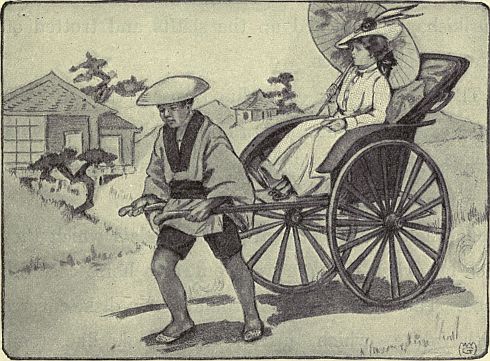
Did you ever go to sleep and dream you were in a doll’s country, where you seemed like a giant? Alice said she knew now just how that other Alice felt in her visit to Wonderland, for she never saw such tiny little people, and such tiny little houses, and even such tiny little trees.
When we got on shore we found queer little two-wheeled carriages, drawn by men instead of horses. The carriages are called jinrikishas, and are just big enough for one person.
We each got into one of these carriages and the jinrikisha boys picked up the shafts and trotted off like nice little ponies.
These boys wear dark-blue trousers that fit their legs very tightly, and a short blue jacket with flowing sleeves, and on their back is a Chinese letter painted in white, which is their employer’s name.
On their feet they wear straw sandals which they kick off, when they are worn out, as a horse casts his shoe. The hat is a funny round straw disk, covered with white, which makes them look like toadstools.
The houses, as I said, are very tiny, not much larger than your playhouses, and the walls are all made of sliding screens that can be pushed aside, leaving the house open.
The floors are covered with matting, which is as![]() 121
121![]() soft as cushions, but there is no furniture anywhere
to be seen, for the Japanese sit on the floor and sleep
on the floor, and their tables are tiny little trays.
soft as cushions, but there is no furniture anywhere
to be seen, for the Japanese sit on the floor and sleep
on the floor, and their tables are tiny little trays.
The houses are spotlessly clean, for no Japanese would think of going into a house with his shoes on, any more than you would walk over your mother’s chairs and cushions in your shoes.
One day we went to see a wonderful image. We rode out to it in jinrikishas, and we each had two ’rikisha boys to pull us. We sped along at a rapid pace, for the boys are so well trained that they make nearly as good time as a horse, and a day’s run is sometimes as much as forty miles.
We had a regular Japanese “tiffin,” or lunch, at a little Japanese inn that had a pretty garden all around it. We took off our shoes at the door just as the Japanese do, and walked across the soft, matted floor.
A screen was drawn aside for us to enter, and then
closed again, leaving us in a little room. Here we all
squatted on our heels, as nearly like a Japanese as![]() 122
122![]() our stiff muscles would let us, for, without being
trained, it is hard to shut up like a jackknife.
our stiff muscles would let us, for, without being
trained, it is hard to shut up like a jackknife.
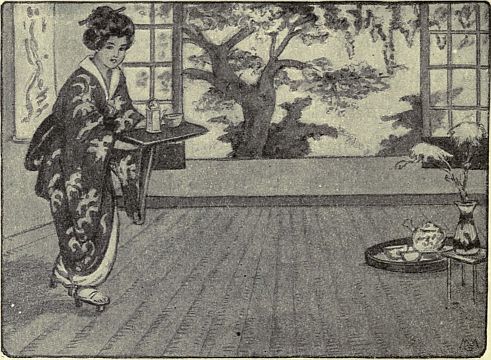
Then pretty little Japanese girls stole in noiselessly, bringing us trays of food, one for each person, and knelt down beside us to uncover our dishes and wait on us.
In one tiny bowl was some vegetable soup, in another some rice, and in a third some fish, which was cooked for us, though to have been truly Japanese we should have eaten it raw.
Of course there was tea. Everywhere you go they give you tea in wee cups without handles; just about a thimbleful, without cream and without sugar; not at all as we drink it at home.
But with all this feast before us, there was nothing to eat it with but two funny little chopsticks, and terrible times we had trying to manage those little sticks that serve the Japanese so well, but which seemed bewitched the minute we got them between our fingers.
After trying a long time we would get a mouthful, as we thought, firmly fixed between the chopsticks, but just as we would open our mouths to take it in, the bewitched chopsticks would give a twitch, and down the whole thing would fall again.
So, though we spent much time over it, we ate very little, and we all agreed that it is better to eat with forks as we do in America.
After tiffin we went to a silk factory, for a great
deal of silk is manufactured in Japan. There we
found over three thousand girls and women busy![]() 124
124![]() unrolling the cocoons. The silk is woven in another
place, and rolled in neat rolls, ready for sale.
unrolling the cocoons. The silk is woven in another
place, and rolled in neat rolls, ready for sale.
Most of the way we rode along the beach, where we could see the fishermen in their boats, and in one boat was a boy we called Urashima, for when we looked for him a second time he had disappeared.
—Charlotte Chaffee Gibson.
What do the Japanese call their country?
Where was the big ship anchored?
How did the passengers get from the ship to the shore?
What is a jinrikisha? How is it drawn?
Describe a Japanese house.
What is the Japanese word for lunch?
What did the children have to eat at the inn?
What did they have to eat it with?
Where did they go after “tiffin?”
What would you like to do if you should go to Japan?
Urashima was a fisher-boy who lived long ago in Japan.
One day he went out in his boat, and after he had been fishing a little while, he felt something very heavy tugging at his line.
He gave a hard pull and got it up into his boat. Then he found that it was a big tortoise with such a funny old wrinkled face that he burst out laughing when he saw it.
In Japan a tortoise lives a thousand years, so Urashima thought it would be a shame to kill this funny old fellow, when he might have so long to live. Besides, a small fish would suit him just as well for dinner, so he threw the tortoise back into the sea, and meant to go on fishing.
But somehow the air seemed too heavy and drowsy, just as it does on a summer’s day, and Urashima fell asleep.
While he was sleeping a beautiful maiden rose out![]() 126
126![]() of the water and got into the boat with him. Urashima
waked, and when he saw her he thought she
was the most beautiful creature he had ever seen.
of the water and got into the boat with him. Urashima
waked, and when he saw her he thought she
was the most beautiful creature he had ever seen.
The maiden spoke to him. “Urashima,” she said, “you thought you caught a tortoise a little while ago, but it was really me. My father had sent me in disguise to see if you were a good, kind boy.
“We know now that you are kind-hearted, as you spared the life of the old tortoise. So I am going to take you with me to the Dragon Palace, where my father, the Sea King, and I live. There you shall marry me, and we shall be very happy.”
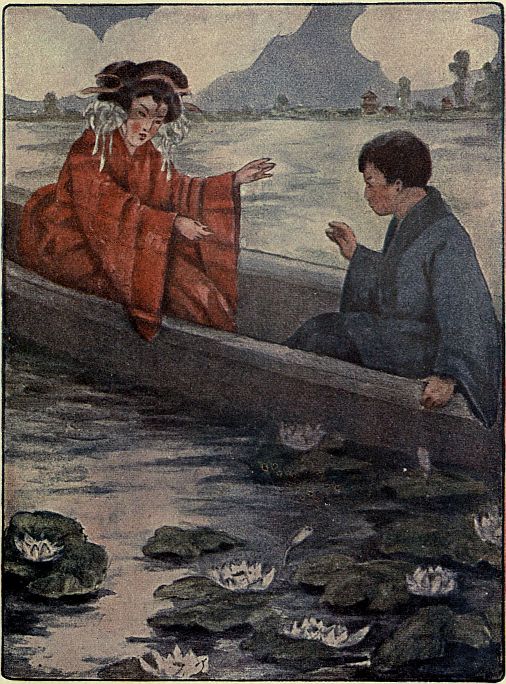
Urashima gladly consented, and they floated away till they came to a wonderful palace at the bottom of the sea.
This palace was all built of the most beautiful pink and white coral, and was studded with diamonds and pearls.
The leaves of the trees were emeralds, with berries of rubies and sapphires; and the fishes’ scales were of pure silver and gold.
All this was given to Urashima, and the beautiful princess became his wife. Any boy would be happy in such a palace, and Urashima was happy for three years.
Then he said to the princess, “I must go to see my father and mother, and my brothers and sisters, but I will return again to you.”
This made the poor princess very sad, for she did not wish to have Urashima go away.
But when she saw how much he wished to go, she gave him a little box to take with him, telling him under no conditions to open it, for if he did he could never return to her.
So Urashima started off, and soon found himself on the shore where he had lived. But everything seemed strangely different. Even the people were different and looked at him in a curious way.
He could not seem to find his way home, so he asked two men whom he met if they could tell him how to reach the house of Urashima’s parents.
“Urashima!” they cried. “Why, he was drowned![]() 128
128![]() out fishing about four hundred years ago, and not even
his body was found. His father and mother are
buried over there.”
out fishing about four hundred years ago, and not even
his body was found. His father and mother are
buried over there.”
Then they moved away hastily, for they thought he must be insane.
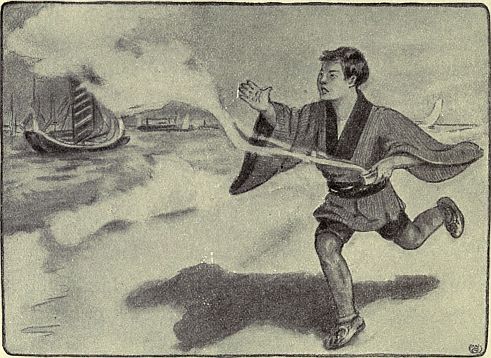
Poor Urashima could not think what to do. He began to think that the Dragon Palace must be a part of Fairyland, where a day is the same as a year on earth, and he wished to return to it. But how could he find the way?
He could not remember how he had come.
Suddenly he thought of the box that the princess had given him, and forgetting that he had promised not to open it, he pulled open the lid, hoping to learn the way back.
There was nothing in the box but a fleecy white cloud that floated softly up into the blue sky.
Then, too late, he remembered what the princess had said, and he called and called the cloud to come back. He even ran along the beach trying to catch it.
But soon he could not call, for his breath came shorter and shorter, his hair turned white, and his back became weak and bent.
Finally he fell down on the beach, crushed by the weight of his four hundred years.
—Charlotte Chaffee Gibson.
How did I know what the ants had for dinner last Monday? It is odd that I should have known, but I’ll tell you how it happened.
I was sitting under a big pine tree, high up on a hillside. The hillside was more than seven thousand feet above the sea, and that is higher than many mountains which people travel hundreds of miles to look at. But this hillside was in Colorado, so there was nothing wonderful in being up so high.
I had been watching the great mountains with snow on them, and the great forests of pine trees—miles and miles of them—so close together that it looks as if you could lie down on their tops and not fall through; and my eyes were tired with looking at such great, grand things, so many miles off.
So I looked down on the ground where I was sitting, and watched the ants which were running about everywhere, as busy and restless as if they had the whole world on their shoulders.
Suddenly I saw a tiny caterpillar, which seemed to be bounding along in a very strange way. In a second more I saw an ant seize hold of him and begin to drag him off.
The caterpillar was three times as long as the ant, and his body was more than twice as large round as the biggest part of the ant’s body.
“Ho! ho! Mr. Ant,” said I, “you needn’t think you’re going to be strong enough to drag that fellow very far.”
Why, it was about the same thing as if you or I should drag off a calf, which was kicking and struggling all the time; only that the calf hasn’t half so many legs to catch hold of things with as the caterpillar had.
Poor caterpillar! how he did try to get away! But the ant never gave him a second’s time to take a good grip of anything; and he was cunning enough, too, to drag him on his side, so that he couldn’t use his legs very well.
Up and down, and under and over stones and sticks;![]() 133
133![]() in and out of tufts of grass; up to the very top of the
tallest blades, and then down again; over gravel and
sand, and across bridges of pine needles from stone
to stone; backward all the way ran that ant, dragging
the caterpillar after him.
in and out of tufts of grass; up to the very top of the
tallest blades, and then down again; over gravel and
sand, and across bridges of pine needles from stone
to stone; backward all the way ran that ant, dragging
the caterpillar after him.
I watched him very closely, thinking, of course, he must be going toward his house. Presently he darted up the trunk of a pine tree.
“Dear me!” said I, “ants don’t live in trees! What does this mean?”
The bark of the tree was all broken and jagged, and full of seams twenty times as deep as the height of the ant’s body. But he didn’t mind; down one side and up the other he went.
They must have been awful chasms to him, and yet he never once stopped or went a bit slower. I had to watch the ant very closely, not to lose sight of him altogether.
I began to think that he was merely trying to kill
the caterpillar; that, perhaps, he didn’t mean to eat
him, after all. How did I know but some ants might![]() 134
134![]() hunt caterpillars, just as some men hunt deer, for
fun, and not at all because they need food?
hunt caterpillars, just as some men hunt deer, for
fun, and not at all because they need food?
If I had been sure of this, I would have spoiled Mr. Ant’s sport for him very soon, you may be sure, and set the poor caterpillar free. But I never heard of an ant’s being cruel; and if it were really for dinner for his family that he was working so hard, I thought he ought to be helped, and not hindered.
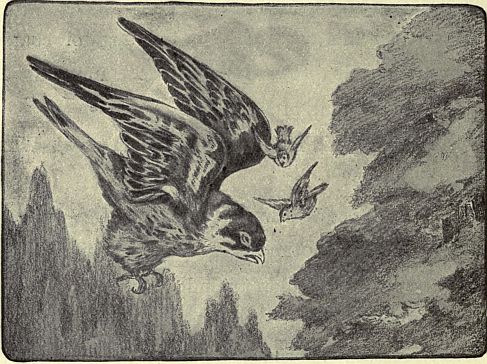
Just then I heard a sharp cry overhead. I looked
up, and there was an enormous hawk, sailing round in![]() 135
135![]() circles, with two small birds flying after him. They
were pouncing down on his head, and then darting
away, and all the time making shrill cries of fright and
hatred.
circles, with two small birds flying after him. They
were pouncing down on his head, and then darting
away, and all the time making shrill cries of fright and
hatred.
I knew very well what that meant. Mr. Hawk was also out trying to do some marketing for his dinner. He had his eye on some little birds in their nest, and there were the father and mother birds driving him away.
You wouldn’t have believed that two such little birds could drive off such a big creature as the hawk, but they did. They seemed to fairly buzz round his head just as flies buzz round a horse’s head.
At last he gave up the quest and flew off so far that he vanished in the blue sky, and the little birds came skimming home again into the forest.
“Well, well,” said I, “the little people are stronger than the big ones, after all! Where has my ant gone?”
Sure enough! It hadn’t been two minutes that I
had been watching the hawk and the birds, but in that![]() 136
136![]() two minutes the ant and the caterpillar had disappeared.
At last I found them,—where do you think? In a
fold of my coat, on which I was sitting!
two minutes the ant and the caterpillar had disappeared.
At last I found them,—where do you think? In a
fold of my coat, on which I was sitting!
The ant was running round and round the caterpillar. I shook the fold out, and as soon as the cloth lay straight and smooth, the ant fastened his nippers into his prey and started off as fast as ever.
I suppose if I could have seen his face, and had understood the language of ants’ features, I should have seen plainly written there, “Dear me, what sort of a country was that I tumbled into?”
By this time the caterpillar had had the breath pretty well knocked out of his body, and was so limp and helpless that the ant was not afraid of his getting away from him. So he stopped now and then to rest.
Sometimes he would spring on the caterpillar’s back, and stretch himself out there; sometimes he would stand still on one side and look at him sharply, keeping one nipper on his head.
All the time he was working steadily in one direction; he was headed for home I felt certain.
It astonished me very much, at first, that none of the ants he met took any notice of him; they all went on their own way, and never took so much as a sniff at the caterpillar.
But pretty soon I said to myself, “You stupid woman, not to suppose that ants can be as well behaved as people! When you passed Mr. Jones yesterday, you didn’t peep into his market-basket, nor touch the cabbage he had under his arm.”
Presently the ant dropped the caterpillar, and ran on a few steps—I mean inches—to meet another ant who was coming towards him. They put their heads close together for a second.
I could not hear what they said, but I could easily imagine, for they both ran quickly back to the caterpillar, and one took him by the head and the other by the tail, and then they lugged him along finely. It was only a few steps, however, to the ant’s house; that was the reason he happened to meet this friend just coming out.
The door was a round hole in the ground, about as![]() 138
138![]() big as my little finger. Several ants were standing
in the doorway, watching these two come up with
the caterpillar. They all took hold as soon as the
caterpillar was on the doorstep, and almost before
I knew he was there, they had tumbled him down,
heels over head, into the ground, and that was the
last I saw of him.
big as my little finger. Several ants were standing
in the doorway, watching these two come up with
the caterpillar. They all took hold as soon as the
caterpillar was on the doorstep, and almost before
I knew he was there, they had tumbled him down,
heels over head, into the ground, and that was the
last I saw of him.
The oddest thing was, how the ants came running home from all directions. I don’t believe there was any dinner bell rung, though there might have been one too fine for my ears to hear; but in a minute, I counted thirty-three ants running down that hole. I fancied they looked as hungry as wolves.
I had a great mind to dig down into the hole with a stick, and see what had become of the caterpillar. But I thought it wasn’t quite fair to take the roof off a man’s house to find out how he cooks his beef for dinner; so I sat still and wondered whether they would eat him all up or whether they would leave any for Tuesday; then I went home to my own dinner.
—Helen Hunt Jackson.
My Ant lives in the country and keeps a cow. I am ashamed to say that, although I have always known she was a most interesting person, I never went to see her until last week.
I am afraid I should not have gone then, if I had not found an account of her, and her house, and her cow, in a book which I was reading.
“Dear me,” said I, “and there she has been living so near me all this time, and I never have been to call on her.”
To tell the truth, it was much worse than that; I had often met her in the street, and had taken such a dislike to her looks that I always brushed by as quickly as possible without speaking to her.
I had great difficulty in finding her house, though it is quite large. She belongs to a very peculiar family; they prefer to live in the dark; so they have no windows in their houses, only doors; and the doors are nothing but holes in the roof.
The houses are built in the shape of a mound, and are not more than ten inches high. They are built out of old bits of wood, dead leaves, straw, old bones; in short, every sort of old thing that they find, they stick in the walls of their houses. Their best rooms are all down cellar; and dark enough they must be on a rainy day, when the doors are always kept shut tight.
But I ought to have told you about my Ant herself before I told you about her house. When you hear what an odd person she is, you will not be surprised that she lives in such an outlandish house.
To begin with, I must tell you that she belongs to a family that never does any work.
You’d never suppose so, to see her. I really think she is the queerest-looking creature I ever met.
In the first place, her skin is of a dark brown color, darker than an Indian’s, and she has six legs. Of course she can walk three times as fast as if she had only two,—but I would rather go slower and be more like other people.
She has frightful jaws, with which she does all sorts of things besides eating. She uses them for scissors, tweezers, pickaxes, knife and fork, and in case of a battle, for swords.
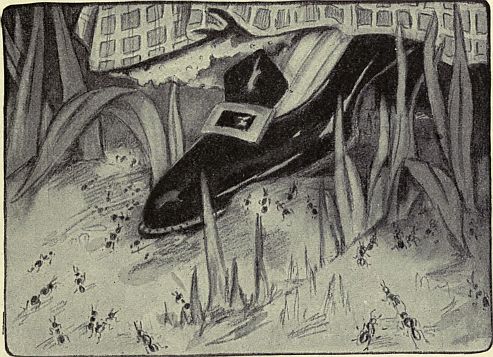
Then she has growing out of the front part of her head two long slender horns, which she keeps moving about all the time, and with which she touches everything she wishes to understand.
The first thing she does, when she meets you, is to![]() 142
142![]() bend both these horns straight towards you, and feel
of you. It is quite disagreeable,—almost as bad
as shaking hands with strangers.
bend both these horns straight towards you, and feel
of you. It is quite disagreeable,—almost as bad
as shaking hands with strangers.
My Ant’s name is Fornica Rufa. If I knew her better I should call her Ant Ru, for short. But I do not expect ever to know her very well. She evidently does not like to be intimate with anybody but her own family; and I am not surprised, for I was never in any house so overrun with people as hers is. I wondered how they knew themselves apart.
When I went to see her last week I found her just going out, and I thought perhaps that was one reason that she didn’t take any more notice of me.
“How do you do, Ant?” said I. “I am spending the summer near by, and thought I would like to become acquainted with you. I hear you have a very curious cow, and I have a great desire to see it.”
“Humph!” said she, and snapped her horns up and down, as she always does when she is displeased, I find.
“I hope it will not give you any trouble to show her![]() 143
143![]() to me. You must be very proud of having such a fine
cow. Perhaps you are on the way to milking now,
and if so I should be most happy to go with you.”
to me. You must be very proud of having such a fine
cow. Perhaps you are on the way to milking now,
and if so I should be most happy to go with you.”
“Humph!” said my Ant again. At least I think that was what she said. It looked like it, but I can’t say that I heard any sound.
But she turned short on her heels (I suppose she has heels), and plunged into the woods at the right, stopping and looking back at me as if she expected me to follow. So I stepped along after her as fast as I could, and said, “Thank you; I suppose this is the way to the pasture.”
My Ant said nothing, but went ahead, snapping her horns furiously.
“Oh, well,” thought I to myself, “you are an uncivil Ant. Even if I have come simply out of curiosity, you might be a little more polite in your own house, or at least on your own grounds, which is the same thing. I sha’n’t speak to you again.”
That’s about all the conversation I have ever had with my Ant. But she took me to the pasture, and I saw her cow.
I am almost afraid to tell you where the pasture was, and what the cow was; but if you don’t believe me, you can look in books written about such things, and they will prove to you that every word I say is true.
The pasture was the stalk of a green brier; and there stood, not only my Ant’s cow, but as many as five hundred others, all feeding away upon it. You have seen millions of them in your lives, for you must know that they are nothing but little green plant-lice, like those that we find on our rosebushes, and that we try in every possible way to get rid of.
Who would ever suppose there could be anything for which these little green plant-lice could serve as cows! I assure you it is true, and if you live in the country you can see it for yourself; but you will have to look through a magnifying glass to see them milked.
Think of looking through a magnifying glass at anybody’s cow! I looked at my Ant’s for an hour, and it seemed to me I hardly winked, I was so much interested in the curious sight.
Its skin was smooth as satin and of a most beautiful light green color. It had six legs, and little hooks at the end, instead of hoofs. The oddest thing of all was that the horns were not on its head, but at the other end of its body, where the tail would have been if it had had a tail like any other cow.
The horns were hollow tubes, and it is out of them that the milk comes, a drop at a time. The milk is meant for the little plant-lice to drink before they are old enough to hook their six legs on to stalks and leaves, and feed on sap.
But I think that in any place where there are many of my Ant’s race, the little plant-lice must fare badly, for the Ants are so fond of this milk that sometimes they carry off whole herds of the plant-lice and shut them up in chambers in their houses. There they feed them as we do cows in barns, and go and milk them whenever they please.
“Oh, dear Ant,” said I to my Ant, “do pray milk your cow! I have such a desire to see how you do it.”
She did not appear to understand me, and I dare![]() 146
146![]() say if she had she would not have done it any sooner.
But presently I saw her go up behind her cow, and
begin to tap her gently on her back, just at the place
where the horns grew out.
say if she had she would not have done it any sooner.
But presently I saw her go up behind her cow, and
begin to tap her gently on her back, just at the place
where the horns grew out.
The cow did not look round nor stop eating, but in a moment out came a tiny drop of liquid from the tip of each tube. My Ant picked it up with her wonderful horns and whisked it into her mouth as quickly as you would a sugarplum.
Then she went on to the next cow and milked that in the same manner, and then to a third one. She took only two drops from each one. Perhaps that is all that this kind of a cow can give at a time.
There were several of her friends there at the same time doing their milking; and I could not help thinking how easy it would be for the great herd of cows to kill my Ant and all her race, if they chose. But it is thought by wise people who have studied these wonderful things that the cows are fond of being milked in this way, and would be sorry to be left alone by themselves.
After my Ant had finished her supper, she stood still watching the cows for some time. I thought perhaps she would be in a better humor after having had so much to eat, and might possibly feel like talking with me. But she never once opened her mouth, though I sat there an hour and a half.
At last it began to grow dark, and as I had quite a long walk to take, I knew I must go, or I should not get home in time for my own supper of milk.
“Good-night, Ant,” said I. “I have had a charming visit. I am very much obliged to you for showing me your cow. I think she is the most wonderful creature I ever saw. I should be very happy to see you at my house.”
“Humph!” said my Ant.
—Helen Hunt Jackson.
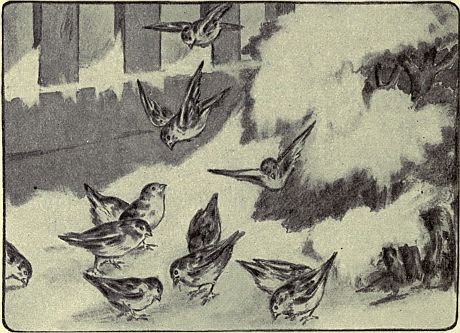
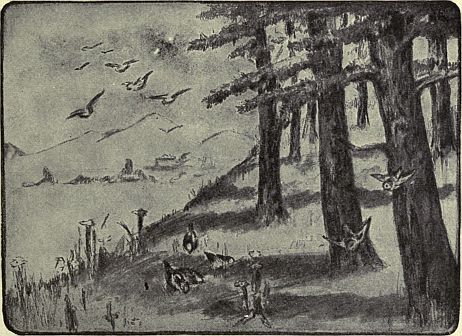
The Peterkins had decided not to go to Egypt.
Of course the little boys were very much disappointed, so Mr. Peterkin said that he would take them out into the woods to get some maple syrup instead. But it was almost as difficult to arrange an excursion for maple sugar as to arrange for a trip to Egypt.
You see, sugar can not be made until it is warm enough to make the sap run. On the other hand, it must be cold enough for snow, as you can only reach the woods on snow-sleds.
Now, if there were sun enough for the sap to rise, it would melt the snow; and if it were cold enough for sledding, it must be too cold for the syrup. The little boys, however, said there always had been maple sugar every spring,—they had eaten it; why shouldn’t there be this spring?
Elizabeth Eliza said that this was probably old sugar they had eaten,—you never could tell in the shops.
Mrs. Peterkin thought there must be fresh sugar once in a while, as the old sugar would be eaten up. She felt the same about chickens. She never could understand why there were only the old, tough ones in the market, when there were certainly fresh young broods to be seen around the farmhouses every year.
She supposed the market-men had begun with the old, tough fowls, and so they had to go on so. She wished they had begun the other way; and she had done her best to have the family eat up the old fowls, hoping they might, some day, get down to the young ones.
As to the weather, she suggested they should go to Grandfather’s the day before. But how can you go the day before, when you don’t know the day?
All were much delighted, therefore, when Hiram appeared with the wood-sled, one evening, to take them, as early as possible the next day, to their grandfather’s.
He said that the sap had started, the kettles had been![]() 155
155![]() on some time, there had been a slight snow for sleighing,
and to-morrow promised to be a fine day.
on some time, there had been a slight snow for sleighing,
and to-morrow promised to be a fine day.
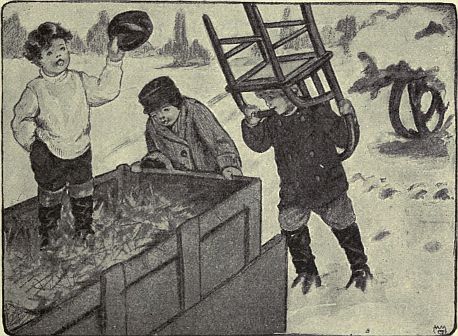
It was decided that he should take the little boys and Elizabeth Eliza in the wood-sled; the others would follow later, in the carryall.
Mrs. Peterkin thought it would be safer to have some of the party go on wheels, in case of a thaw the next day.
A brilliant sun awoke them in the morning. The
wood-sled was filled with hay, to make it warm and![]() 156
156![]() comfortable, and an armchair was tied in for Elizabeth
Eliza.
comfortable, and an armchair was tied in for Elizabeth
Eliza.
The little boys put on their India-rubber boots and their red mittens. Elizabeth Eliza took a shawl, a hot brick, and a big bag of cookies, and they started off.
In passing the school-house the little boys saw five of their friends, who had reached the school door a full hour before the time. They asked these five boys to go with them, but Elizabeth Eliza thought they ought to inquire if their parents would be willing they should go, as they all expected to spend the night at Grandfather’s.
Hiram thought it would take too much time to ask all the parents; if the sun kept on shining so brightly, the snow would be gone before they would reach the woods.
But the little boys said that most of these boys lived in a row, and Elizabeth Eliza felt she ought not to take the boys away for all night without asking their parents.
At each place they were obliged to stop for tippets![]() 157
157![]() and great-coats and India-rubber boots for the little
boys. At the Harrimans’, too, the Harriman girls
insisted on dressing up the wood-sled with evergreens,
and made one of the boys bring the Christmas tree
that was leaning up against the barn, to set it up in
the back of the sled, over Elizabeth Eliza.
and great-coats and India-rubber boots for the little
boys. At the Harrimans’, too, the Harriman girls
insisted on dressing up the wood-sled with evergreens,
and made one of the boys bring the Christmas tree
that was leaning up against the barn, to set it up in
the back of the sled, over Elizabeth Eliza.
All this took a good deal of time; and when they reached the highroad again, the snow was indeed fast melting. Elizabeth Eliza thought they ought to turn back, but Hiram said they would find the sleighing better farther up among the hills.
The armchair joggled about a good deal, and the Christmas tree creaked and swayed, and Hiram was obliged to stop once in a while and tie in the chair and the tree more firmly.
But the warm sun was very pleasant, the eight little boys were very lively, and the sleigh bells jingled gaily as they went on.
It was so late when they reached the wood-road that Hiram decided they had better not go up the hill to their grandfather’s, but turn off into the woods.
“Your grandfather will be up at the sugar camp by this time,” he declared.
Elizabeth Eliza was afraid the carryall would miss them, and thought they had better wait. Hiram did not like to wait longer, and said that one or two of the little boys could stop to show the way.
But it was so difficult to decide which little boys should stay that he gave it up. So he explained that there was a lunch hidden somewhere in the straw; and the little boys thought this was a good time to eat it, so they decided to stop in the sun at the corner of the road.
Elizabeth Eliza felt a little jounced in the armchair, and was glad of a rest; and the boys soon discovered a good lunch,—just what might have been expected from Grandfather’s,—apple pie and doughnuts, and plenty of them! “It is lucky we brought so many little boys!” they exclaimed.
Hiram, however, began to grow impatient. “There’ll be no snow left,” he exclaimed, “and no afternoon for the syrup!”
But far in the distance the Peterkin carryall was seen slowly approaching through the snow, Solomon John waving a red handkerchief. The little boys waved back, and Hiram turned the sled into the wood-road, but he drove slowly, as Elizabeth Eliza still feared that by some accident the family might miss them.
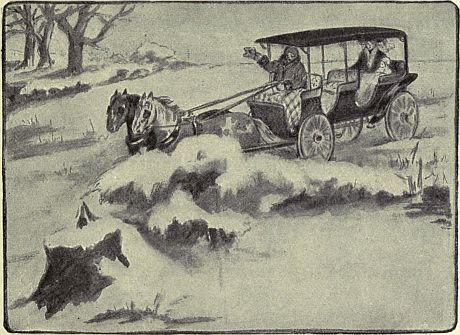
It was difficult for the carryall to follow in the deep but soft snow, in among the trunks of the trees and over piles of leaves hidden in the snow.
At last they reached the edge of a meadow. On the high bank above it stood a row of maples, and back of which was a little shanty with smoke coming out of its chimney. The little boys screamed with delight, but there was no reply. Nobody there!
“The folks all gone!” exclaimed Hiram; “then we must be late.” And he proceeded to pull out a large silver watch from a side pocket. It was so large that he seldom was at the pains to pull it out, as it took time; but when he had succeeded at last, and looked at it, he started.
“Late, indeed! It is four o’clock, and we were to have been here by eleven; they have given you up.”
The little boys wanted to force in the door; but Hiram said it was no use,—they wouldn’t understand what to do, and he should have to see to the horses,—and it was too late, and very likely the men had carried off all the syrup.
But he thought a minute, as they all stood in silence
and gloom; and then he guessed they might find some![]() 161
161![]() sugar at Deacon Spear’s, close by, on the back road, and
that would be better than nothing.
sugar at Deacon Spear’s, close by, on the back road, and
that would be better than nothing.
Mrs. Peterkin was pretty cold, and glad not to wait in the darkening wood; so the eight little boys walked through the wood-path, Hiram leading the way; and slowly the carryall followed.
They reached Deacon Spear’s at length; but only Mrs. Spear was at home. She was very deaf, but could explain that the family had taken all their syrup to the sugar festival.
“We might go to the festival,” exclaimed the boys.
“It would be very well,” said Mrs. Peterkin, “to eat our fresh syrup there.”
But Mrs. Spear could not tell where the festival was to be, as she had not heard; perhaps they might know at Squire Ramsay’s.
Squire Ramsay’s was on their way to Grandfather’s, so they stopped there. They were told that the “Squire’s folks” had all gone with their syrup to the festival. The man who was chopping wood did not know where the festival was to be.
“They’ll know at your grandfather’s,” said Mrs. Peterkin, from the carryall.
“Yes, go on to your grandfather’s,” advised Mr. Peterkin, “for I think I felt a drop of rain.” So they made the best of their way to Grandfather’s.
At the moment they reached the door of the house, a party of young people whom Elizabeth Eliza knew came by in sleighs. She had met them all when visiting at her grandfather’s.
“Come along with us,” they shouted; “we are all going down to the sugar festival.”
“That is what we have come for,” said Mr. Peterkin.
“Where is it?” asked Solomon John.
“It is down your way,” was the reply.
“It is in your own New Hall,” said another. “We have sent down all our syrup. The Spears and Ramsays and Doolittles have gone on with theirs. No time to stop; there’s good sleighing on the old road.”
Hiram said he could take them back with the wood-sled,
when he heard there was sleighing on the old road.
So it was decided that the whole party should go in![]() 163
163![]() the wood-sled, with the exception of Mr. Peterkin,
who would follow on with the carryall.
the wood-sled, with the exception of Mr. Peterkin,
who would follow on with the carryall.
Mrs. Peterkin would take the armchair, and cushions were put in for Elizabeth Eliza, and more apple pie for all. No more drops of rain appeared, though the clouds were thickening over the setting sun.
“All the way back again,” sighed Mrs. Peterkin, “when we might have stayed at home all day, and gone quietly out to the New Hall!” But the little boys thought the sledding was great fun,—and the apple pie! “And we did see the kettle through the cracks of the shanty!”
—Lucretia P. Hale.
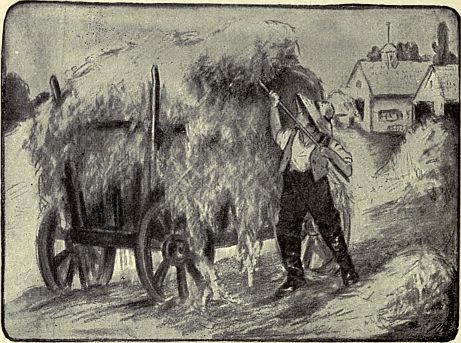
The four baby squirrels were tired of staying in their soft nest in the hollow tree. They wanted to find out what was going on in the world outside.
As they cuddled together in the shadowy hole they could hear the queerest sounds. They cocked their heads curiously at the rustling and whispering of the wind among the leaves. They heard chirping and singing, and a silvery tinkle, tinkle from the brook.
Once a bee flew buzzing right over their heads, and made them clutch one another in terror.
One morning, when the old mother squirrel was away hunting for birds’ eggs to eat, the smallest baby crept to the mouth of the hole and peeped out with his round bright eyes.
All around and above him there were wonderful green things flickering and fluttering. Twinkles of sunlight danced through the leaves and dazzled him. Something soft and cool blew back the new bristles on his lips and ruffled his satiny red fur.
He was so much interested that he sat there, staring and staring, till the other little ones began to squeak and scold him for shutting out the light.
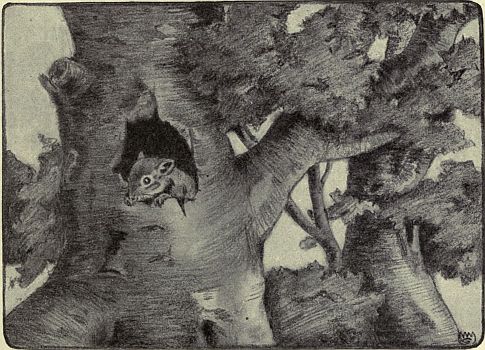
After he crept down again to the nest the others climbed up, one by one, and looked out. They blinked and winked at each wonderful sight; they sniffed the strange odors, and twitched their eager little heads at every new sound.
The scream of a blue jay in the tree-top above them
sent them scampering inside again, to cuddle close![]() 168
168![]() together in the darkest corner. It was fun to see
something new and exciting, even if it did make them
shiver all over.
together in the darkest corner. It was fun to see
something new and exciting, even if it did make them
shiver all over.
Soon the mother squirrel came springing from branch to branch to reach the hollow.
How the babies squeaked and chattered in welcome! Very likely they told her about the wonderful sights and sounds in the strange world outside the hole.
The smallest one clasped his fore paws around her neck, and coaxed her to let them all go out to find more interesting things. It was stupid there in the dark nest, with nothing to watch except the patch of light across the opening above them.
The old squirrel knew that the little ones were not strong enough yet to leave the nest.
To be sure, they had grown and changed very much since the first days. Then they had been ugly little creatures, like tiny pug dogs, with big heads, no fur, and their eyes tight shut.
Now they were half as big as she was herself. Their![]() 169
169![]() eyes were like jewels, and their red fur was smooth as
satin.
eyes were like jewels, and their red fur was smooth as
satin.
But their tails, with only fringes of hair along the sides, were not nearly so fluffy as the mother’s. Her tail was long and plumy. It curved so gracefully over her back that she seemed to be sitting in its shadow. One name of the squirrel is “shadow-tail.”
For a few weeks longer the four babies scrambled about the doorway and looked longingly out at the wonderful green tree-world. They did not dare to step out upon the slender branches, for fear of falling off.
It made them feel dizzy to look away down to the ground below. They did not know how to cling to the limbs with their feet while they balanced themselves with their tails.
When the young squirrels were almost strong enough to learn to run and climb in the tree, the mother began to build another home higher up the trunk. The old nest was growing too warm for comfort, as summer brought the long sunny hours.
The squirrel father was not there to help his mate.
The mother squirrel thought the tree belonged to her, and that she needed all the room in the hollow for her little ones. She chased him off to live in the woods with all the other squirrel fathers till the babies were big enough to take care of themselves.
The mother squirrel worked on the new nest in the early morning. She bit off leafy twigs and carried them to the top of the tree. There, where two branches forked, she packed the sticks and leaves together in a loose ball.
Then she pushed a doorway through, at one side or another, just as she happened to be standing.
This was not such a neat home as one in the next tree. That other mother squirrel built her new nest of strips of bark tied together with ribbons of soft fibre. Over the doorway she hung a curtain of bark, and lifted it up carefully whenever she went inside.
At last the new home was ready. The old mother hurried down to the hollow and called the babies to come out and follow her. They stepped out, one after another, just as carefully as they could.
The smallest baby came last. He dug his claws into the bark and hung on. The branch seemed so narrow that he trembled from fear of falling.
The tree swayed in the wind. The branch bounced up and down, and a leaf blew in his face. The poor little fellow shut his eyes, because everything seemed to be whirling round and round.
When he opened his eyes again he saw the three other little ones climbing up the trunk above him. They clutched the bark with their claws, and moved forward, one paw at a time.
The mother was running on ahead of them. Every few steps she turned around to coax them on faster.
Finally they reached a narrow branch which led over to the new nest. They crawled out on it, lifting one foot and then setting it down before lifting another.
The farther they crept the narrower the branch
grew under them. Their little paws began to slip
over the smoother bark. The one in front tried to turn![]() 172
172![]() around, but he was afraid of falling. So they all
three scrambled backwards to the safe trunk.
around, but he was afraid of falling. So they all
three scrambled backwards to the safe trunk.
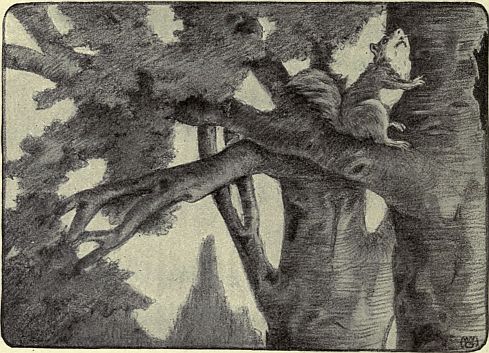
The mother ran back to them, and chattered and scolded. Again and again they started out over the branch, and then went scrambling back.
When at last the mother had coaxed them across to the nest she looked around for the smallest baby. There he was, away down at the door of the old nest.
The old squirrel was tired out. Her fur was ruffled
and her ears drooped. She ran down to the nest and![]() 173
173![]() began to scold the little fellow. He sat up and put his
paws around her to let him stay there.
began to scold the little fellow. He sat up and put his
paws around her to let him stay there.
But she started him up the trunk and pushed him along to the branch. Then she took hold of him by the neck and carried him across to the new home.
After that the little ones were taken out every morning to practise climbing. Little by little they learned to balance themselves on the branches. Their tails were fluffy enough by this time to be of use in balancing.
First to one side, then to the other, each baby tilted his tail as he crept along, step by step. Every day they could move a little faster. Finally they were able to chase one another up and down, from branch to branch.
They went running around the trunks, skipping and leaping from twig to twig, and jumping from one tree to another, even through the air.
Sometimes one or another missed his footing after
a reckless jump. Often he caught hold of a branch![]() 174
174![]() below by a single toe and lifted himself up to a firmer
foothold.
below by a single toe and lifted himself up to a firmer
foothold.
Or, if there was no branch within reach, he spread out his fur, and flattened his tail, and went sailing down to the ground, almost as if he could fly. They never seemed to get hurt.
The little squirrels seemed to be always doing something. They turned somersaults in the grass, or swung by one paw from the tip of a tough branch.
There was always something to do or to see. Now they chattered at a blue jay, or chased a toad for the fun of watching him hop. Now they caught beetles or scolded at a fox slinking along through the woods. And every day there was the excitement of finding something to eat.
The babies lived on milk till they were almost as heavy as their mother. Then she began to feed them with fruit and buds and grubs, which she first chewed for them.
Like the beavers and the hares and rabbits, each
had four chisel teeth in the front of its mouth. They![]() 175
175![]() needed to gnaw hard nuts or bark every day to keep
these teeth from growing too long.
needed to gnaw hard nuts or bark every day to keep
these teeth from growing too long.
The young squirrels were three months old in July and were then big enough to take care of themselves. Away they scampered from the old home tree and found new homes in stumps and hollows. The smallest one used to curl up in an old robin’s nest to sleep at night.
All day long they were as busy as they could be. There were cones to be gathered from the evergreens. The little squirrels ran up the trees in a hurry, and, cutting off the cones with their sharp teeth, tossed them over their shoulders to the ground. Every few minutes they scurried down to bury the cones under the pine needles for the winter.
Sometimes a drop of sticky pitch from the cut stems was rubbed against their fur. That made them so uncomfortable that they had to stop and lick it off.
The squirrels loved to be clean. Ever since they
were tiny babies, with their new red fur, they always![]() 176
176![]() helped one another with washing their faces and
combing their tails with their claws.
helped one another with washing their faces and
combing their tails with their claws.
They were careful to run along logs over a muddy spot. If one happened to get wet he dried himself with his fluffy tail.
When they were tired of eating seeds and twigs they hunted for grubs. Clinging to the bark of a dead tree, they listened till they heard something gnawing beneath the surface. Then, tearing off the bark in ragged pieces, they pounced upon the flat whitish grub beneath and ate him up.
But the best time of all came in the autumn when nuts were ripe. Then what fun the little squirrels had! Early every morning out popped the little heads from the hollow stumps and logs. The big round eyes twinkled eagerly in every direction. Then, whisk! they were out, with a bark and a squeak!
Scampering to the top of a tree, each one took a flying leap to the next tree. Up and down they followed the squirrel-paths through the woods till they reached the grove, where the nuts were ripening.
It was a busy place, with little wings fluttering and little feet pattering, and yellow leaves drifting down in the sunshine. All the squirrels scurried to and fro, picking one nut here, and another there.
They sat on the branches, with their bushy tails curving over their backs, and held the nuts in their fore paws to nibble. The smallest baby could open the hardest walnut and clean it out in less than a minute.
All the while the blue jays and the thrifty chipmunks were gathering nuts and corn, and hiding their stores for the winter. That seemed so interesting that the squirrels gathered some, too.
Autumn passed away, and the days grew colder. In the woods the leaves were all fallen and the branches were stripped bare of nuts.
Every morning when the squirrels poked out their heads the air nipped their noses. Frost sparkled on the dead grass. The chipmunks had crept into their holes for the winter, and most of the birds had flown away south.
The squirrels were not quite so gay now as in the autumn days, when they danced upon the branches and whistled and chuckled over the good things to eat and the curious sights to see. They slept with their warm tails wrapped over their noses.
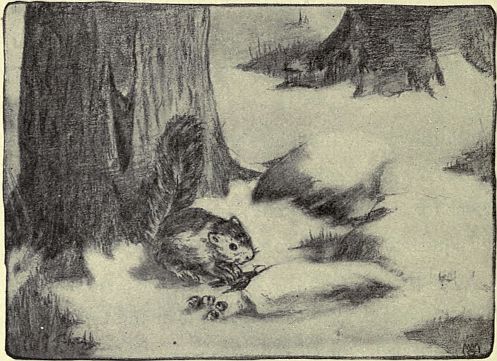
They still ran busily through the tree-tops, except when snow or icy rain kept them shut within their holes. They ate all the nuts they could find, and dug up the buried pine cones. They climbed the hemlock trees and ate the seeds.
Once the smallest squirrel happened to dig up a heap of nuts from between two stones under the snow. He could not remember whether he had hidden them himself or not. How he squealed when he saw them!
Late in the winter the squirrels had eaten all the nuts and cones within reach. They were so hungry on many a day that they tried to creep into a chipmunk’s hole and steal his store of food. But he was smaller than they were, and he had wisely made one bend in his tunnel too small for them to pass.
Then they had to live on bark and seeds till spring started the tender green plants to growing.
The squirrels gnawed the bark of the maple trees and drank the sweet sap that came oozing out. Later there were elm buds to nibble and birds’ eggs to suck. The woods were once more green with juicy leaves.
All the squirrels went to housekeeping. Soon in almost every tree there was a family of squirrels peeping out with their round, bright eyes.
—Julia A. Schwartz.
For days and days the baby opossums lay crowded close together in their mother’s furry pocket. They slept and drank milk, and grew and grew till their eyes began to open.
It was dark all around them, but above their heads a gray line showed where light was stealing in over the edge of the pocket.
The biggest baby opossum looked up with his little bright eyes. He wanted to see more. So he crawled up, clambering over the soft tiny bodies of the eleven other babies.
Some of them wriggled and squirmed under his little bare feet. After slipping back once or twice he reached the edge and poked his pointed white snout outside.
He could not see anything because he was under his mother, and her long fur hung down over him. She was lying on a nest of grasses in a hollow tree.
That was where she stayed all day long while the
sun was shining. Every night at dusk she climbed![]() 181
181![]() down the rough trunk and went to hunt for something
to eat.
down the rough trunk and went to hunt for something
to eat.
When she felt the tiny claws of her baby clutching her fur she looked down between her fore paws at the little mouse-like fellow.
Then with her smooth pink hands she gently pushed him back into the pocket and closed the opening. He was not big enough yet to come out of the warm dark nursery.
So for a week longer he cuddled down beside the others, while they all slept and drank more milk and grew stronger every hour.
The biggest baby was so restless that he scrambled around and crowded the others. Once he caught hold of a tiny tail between the thumbs and fingers of his hind feet, and pulled till the little one squeaked. His fore feet were like tiny hands without any thumbs.
At last, one day, he saw the edge of the pocket open a crack. He was so glad that he climbed up as fast as he could scramble, and pushed outside. He held on to his mother’s fur with all four feet.
When she reached down to smell him the bristles on her lips tickled his nose. Then he climbed around upon her back and twisted his tail about hers to hold him steady.
He looked like a mouse with his long tail, his black ears, his bright eyes twinkling in his little white face, and his pointed nose.
In a few minutes another and another baby followed the big brother and clung there on the mother’s furry back. It must have seemed a noisy place to them, for in the pocket they had heard only the soft rustling and scratching of the mother’s feet on the nest.
Now they could hear a chirping, and a squeaking, and a rattling of branches. They crowded close together in fright at the scream of a blue jay, as it chased a chattering red squirrel through the tree-top.
Then a sudden loud thump—thump—thump of a woodpecker hammering on the bark of the tree sent them tumbling back to the nursery in a hurry.
After this the whole family climbed out every day to play about on the mother’s back. The biggest baby liked to curl his small tail about her large one, and then swing off head downward.
Sometimes he pushed the others down just for the fun of seeing them scramble up again, hand over hand, clutching the long fur.
Of course he was the first one to poke his head out every day. Once he woke from a nap in the pocket and started to climb outside.
But he stopped halfway, hanging to the edge with both fore feet. It was nearly evening, and the mother opossum was clambering down the tree-trunk to go hunting for her supper.
The baby held on tightly while she trotted away through the woods. Now and then a leaf rustled or a stick cracked under her feet. Sleepy birds were twittering in their nests.
The mother pricked her ears and listened, for she
ate eggs and young birds whenever she could find
them. She had not tasted an egg this spring, because![]() 184
184![]() she could not climb very nimbly with her pocket
full of babies.
she could not climb very nimbly with her pocket
full of babies.
Soon she came to a swamp, and splash, splash, splash! the mud went flying. It spattered the baby’s face and made him cough.
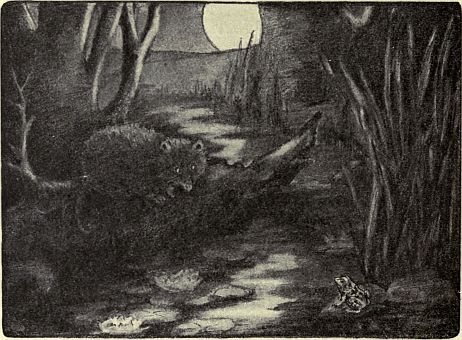
Then he heard the croakings of dozens of frogs, and it frightened him so that he slid back into the nursery with his brothers.
The mother was trying to catch a frog to eat. Now
she jumped this way, and now she jumped that way.![]() 185
185![]() Such a jounce as the babies felt when she gave a
spring for a big green fellow sitting on a log.
Such a jounce as the babies felt when she gave a
spring for a big green fellow sitting on a log.
She caught him, too, but the jounce almost knocked the breath out of the twelve soft bodies in her pocket.
Every day the babies stayed outside the nursery for a longer time, though they were always ready to hurry back at the mother’s first warning grunt.
They kept growing bigger, too, till one night they could not all crowd into the pocket. Then they cuddled together on her back, with their tails twisted around hers.
In this way they rode through the woods when she went hunting. They watched with their bright eyes while she turned over rotting logs with her snout to catch the grubs underneath.
Sometimes she rooted in the ground for sprouting acorns, or nipped off mouthfuls of tender grass. Once she caught a young rabbit. Then how excited the little opossums were! And how they all squeaked and hissed together as they rode trotting home.
By this time they had cut their teeth,—fifty sharp![]() 186
186![]() little teeth in each hungry mouth. Then the mother
picked some sweet red berries, and taught the hungry
babies how to eat them. They learned to chew the
juicy roots that she dug in the field.
little teeth in each hungry mouth. Then the mother
picked some sweet red berries, and taught the hungry
babies how to eat them. They learned to chew the
juicy roots that she dug in the field.
The babies were greedy little things. She was a good and patient mother. Of course, as long as they were small enough to stay in her pocket she carried them everywhere with her. Even when they grew as large as rats they rode on her back through the woods. These twelve fat babies were so heavy that sometimes she staggered and stumbled under the load.
One night when all the babies were trotting along on their own feet they saw gleaming red eyes in the dark bushes before them. Something round and furry snarled and sprang at them.
They all ran under their mother as quick as a wink. She ruffled her long grayish hair above them. When the animal jumped at her she growled, and hissed, and scratched, and bit, till he ran limping away.
On another evening a big dog came galloping up
before they could scramble into a tree. His red tongue![]() 187
187![]() was hanging out of his mouth between his white teeth.
As soon as he caught sight of the opossums he made
a dash to catch them. Instantly they all fell down and
rolled over just as if they were dead.
was hanging out of his mouth between his white teeth.
As soon as he caught sight of the opossums he made
a dash to catch them. Instantly they all fell down and
rolled over just as if they were dead.
There they lay, with their eyes shut, their paws limber, their tails limp. They seemed to stop breathing. The dog smelled them and pushed them with his cold nose.
But they kept perfectly still and did not move even an eyelash. They were pretending to be dead. It was one trick that they all knew without being taught.
The minute the dog walked away they all jumped up and scampered into a tree. When the dog turned his head and saw them he ran back and leaped up to reach them.
But all the opossums were safe enough now. While he was jumping and barking below they clung fast in the tree with their hand-like feet. They wound their tails about the branches above to hold more securely.
The little opossums learned to climb all sorts of![]() 188
188![]() trees, rough or smooth. It was easier to climb the
rough trees because they could dig their nails farther
into the bark.
trees, rough or smooth. It was easier to climb the
rough trees because they could dig their nails farther
into the bark.
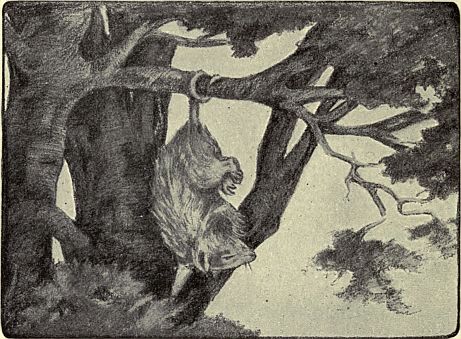
The biggest baby could walk along the springiest limb, even if it kept teetering up and down in the wind. When he felt like it he swung by his tail the longest time without getting dizzy.
All summer long the twelve little opossums stayed
with their mother. During the day they slept cuddled
in the hollow tree. Every night, after sunset,![]() 189
189![]() the mother and her twelve children set off on their
hunting.
the mother and her twelve children set off on their
hunting.
Down through the marsh they trotted. Some waded into the mud to catch frogs, while others chased mud turtles over the shore. Some hunted for berries and others nosed for acorns under the oaks.
It was beautiful there in the woods at night. When the stars twinkled overhead and the soft wind rustled in the tree-tops the little ones frisked and frolicked.
They hid under the shadowy bushes or jumped hither and thither to snap at the fluttering moths.
But on stormy evenings they plodded on in the rain, their wet fur drooping. With their noses close to the ground they hunted till they found a few mouthfuls to eat. Then they went back to the cosy hollow for a longer nap, after licking their pink hands and washing their faces, just as kittens do.
One night, in autumn, the old mother opossum
felt the nip of frost in the air. Then she knew that
the persimmons were ready to be eaten. Away![]() 190
190![]() through the woods she hurried, with the young ones
trotting after her.
through the woods she hurried, with the young ones
trotting after her.
She led the way past the marsh and over the hill to a thicket of trees tangled with wild grapevines. There on the branches the round persimmons were shining yellow in the moonlight.
Up the trees eleven of the babies scrambled hungrily, and, hanging by their tails, stuffed the fruit into their wide mouths. Ah! But wasn’t it delicious! Better than anything they had ever tasted before in all their short lives.
Then the biggest baby, who had stopped to gobble ripe grapes, heard them munching so greedily. One look sent him hurrying after the others. He was sorry enough that he had wasted any time eating wild grapes.
Night after night, till the little persimmons were gone, the opossums hurried away to the thicket, and ate and ate till they could eat no longer. They grew so fat that they puffed and panted when trotting home again in the gray light of the frosty dawn.
Soon the ground was frozen hard over the juicy roots. All the fruit left in the woods hung wrinkled and frost-bitten. The worms and toads crawled into their holes for the winter. The beetles disappeared, and the spiders curled up in their hiding places to sleep through the cold weather. Most of the birds flew away south.
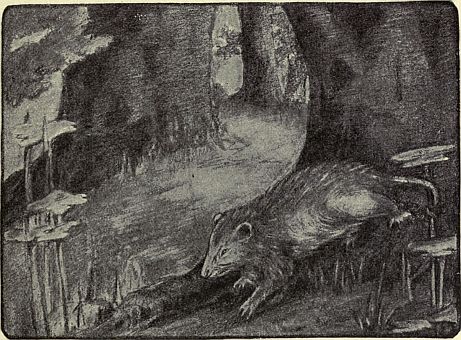
One by one each little opossum wandered off by
himself, and made a nest in a cosy hole or a hollow![]() 192
192![]() stump. There he dozed all day and often slept through
the night without stirring out.
stump. There he dozed all day and often slept through
the night without stirring out.
Now and then one of them caught a mouse or dug up a frozen root to nibble. Sometimes they tore rotten logs apart to get at the grubs.
In the beginning of the winter the little opossums were so fat that they could live three or four weeks without eating or drinking. When the cold winds blew, and the snow fell, they cuddled down in their warm nests and slept the time away. But many a night they woke up hungry. And every day their round furry bodies were a little thinner, till at last, spring melted the snow and ice everywhere.
There was plenty to eat by that time, with all the green things growing. There were buds to nibble and beetles to catch. There were frogs croaking in the marsh, and berries were ripening in the field.
The twelve little opossums were grown up now, and knew how to take care of themselves. Their mother had another family of babies in her furry pocket.
Sometimes she met her other children roaming beside the marsh to catch frogs. One evening they saw a little pointed nose, and two twinkling bright eyes, peeping over the edge of her pocket.
—Julia A. Schwartz.
Once upon a time there was an Emperor of China, named Lee Wong. He would have been a very good Emperor if he had not been spoiled by kindness.
If he cried when he was a baby, his nurse called all the nurses in the palace.
They called the attendants, and the attendants called the musicians. The musicians played, the attendants danced, and the nurses walked up and down wheeling the baby in his carriage until he stopped crying. Sometimes this happened many times in one day.
When Lee was a boy he had his own way in everything. If he played soldier he was always the general. If he went to fly kites, he had the ones that would fly the highest.
Sometimes he wished to fly his kites when the wind
did not blow. Then the poor attendants had to blow![]() 195
195![]() with a huge bellows to make the kites sail up into the
air.
with a huge bellows to make the kites sail up into the
air.
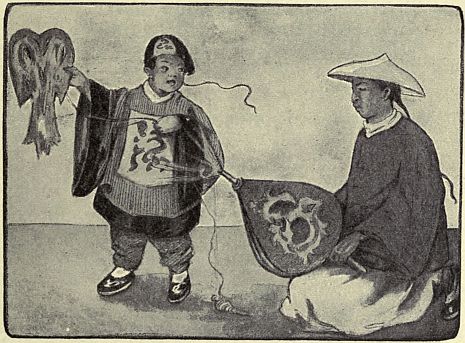
If he wished it were summer in the winter-time, they filled his playroom with beautiful plants and brought canaries and nightingales to sing to him.
In the hot summer days, if he longed for winter,
they brought evergreen trees to the playroom. They
covered the branches with cotton sprinkled with
diamond dust to look like snow. They brought![]() 196
196![]() cakes of ice and made a skating rink and jingled sleigh
bells all day long while he played.
cakes of ice and made a skating rink and jingled sleigh
bells all day long while he played.
When he was a young man it was still worse. If he said anything, like, “This is a sunny morning,” or “I think it will rain to-night,” every one cried, “How wise!” “How wonderfully wise!”
So you see the Emperor was spoiled, and this was very unfortunate.
In China, just as in other places, every one longs for spring to come.
One year the Emperor wanted the spring to come more than ever. He had had a dull winter in his city palace and he wanted to go to his country palace.
“Command my brother, the Sun, to shine to-morrow,” he said, to his attendants. “Command the spring to come, also. And be ready, all of you, to go to the country to-morrow.”
One of the attendants wrote the Emperor’s commands on the finest Chinese paper and then burned it in the garden. He thought in this way the commands might reach the sun.
Perhaps they did; for the sun shone beautifully the next day, and the Emperor and his attendants went to the country palace.
The next morning the Emperor waked up very early. A little bird was singing in the garden. It was a lovely day.
The Emperor thought he would go out into the garden to hear the little bird sing.
He put on his silk dressing-gown, his silver shoes, and his gold crown. It was only six o’clock, so no one was awake in the palace.
When the Emperor went into the garden the bird flew into the forest and sang still more sweetly.
“How stupid I was,” thought the Emperor, “I ought to have commanded it to stay here. Now I must go into the woods to see it.”
So he opened the gate and went across the field.
At the edge of the woods a peasant was plowing.
“Good morning, peasant,” said the Emperor,![]() 198
198![]() “That must be an Emperor bird singing in the forest,
because it sings so sweetly.”
“That must be an Emperor bird singing in the forest,
because it sings so sweetly.”
“No, my lord,” said the peasant, taking off his cap, “that is a blackbird.”
“You may call it so,” said the Emperor; “but it is an Emperor bird if I say so, because I am always right. It is as large as a swan, and its feathers are like shining gold.”
“No, my lord,” said the peasant, “it is small and black.”
Just then the blackbird lighted on a post in the fence and began to sing. It was easy to see that the peasant was right.
“There must surely be something wrong,” said the Emperor, “because I never make a mistake.”
“But, my lord, the Emperor can make a mistake. Every one does that. Your attendants may say that you are always right because they wish to please you. Perhaps they even praise what you do, when it is wrong and foolish.”
“I can never believe that,” said the Emperor.
“If you will do as I say,” replied the peasant, “I will prove that I have told you the truth.”
The Emperor promised to do this, although he could not believe he had been deceived.
Just then all the attendants came running across the field, for they had waked up and missed the Emperor.
Tears ran down their cheeks. They wished to have the Emperor think they were weeping because he was gone. He did not know each one had an onion in his handkerchief.
“Command them to stop where they are,” the peasant whispered.
The Emperor made them stop about twenty feet away, right in the middle of a ditch.
“We are weeping because of your absence, beloved Emperor,” said the chief attendant. He wiped his eyes with his handkerchief, and all the others did the same thing.
“How do you dare to stand beside the Emperor, you peasant,” said the Lord Marshal. “Go back to your plow!”
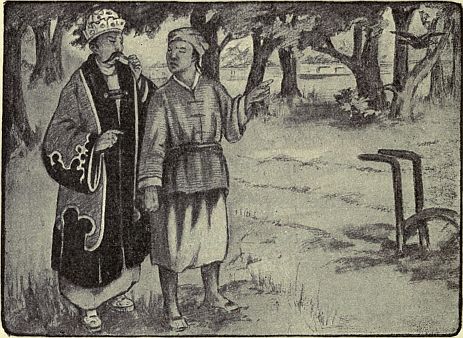
“Say that I am standing beside my plow,” whispered the peasant. He was really standing beside the Emperor, and the plow was thirty feet away.
“Do you not see,” said the Emperor, “that he is standing beside the plow?”
“Oh, yes,” said one, “he is holding the plow with one hand.”
“Yes, yes,” said another, “he is surely driving his oxen.”
“Ask them,” whispered the peasant, “if they ever saw such white oxen.”
Now the peasant’s oxen were coal black, without a single white spot on them.
“Have you ever seen such beautiful white oxen?” said the Emperor, pointing to the black ones.
“No, never,” said one, “they are indeed snow white.”
“Yes,” said another, “they are whiter than snow. It hurts my eyes to look at them, they are so white.”
The Emperor knew now that they were not telling the truth, and he decided to punish them.
“Come here,” he called to some peasants who were plowing in the next field.
“There is nothing so pleasant as plowing,” he said to his attendants.
“It is a great pleasure,” said one.
“I enjoy it more than anything in the world,” said another.
“I would rather plow than dance,” said a third.
“I am very glad you think so, my lords,” said the Emperor. “These peasants will be glad to have you plow for them. This is my command. Begin at once!”
There was no help for it. The courtiers did not dare to disobey, so they took hold of the plows and tried to drive the oxen across the long fields.
I do not believe they plowed very well, for they had never touched a plow before, and did not know how to drive oxen.
But the peasant went to the palace and became the Emperor’s chief counsellor.
The Emperor had this story written on a block of marble in golden letters, but few people can read it because it is written in Chinese, and it is very hard to have to read Chinese.
—Anna von Rydingsvärd.
Have you always wondered where the Christmas presents come from? Well, I am going to tell you.
Of course, every one knows that Santa Claus brings them. He comes in a sleigh, driving eight reindeer, and carries the presents down the chimney in a pack on his back.
But where does he get them? That is the question. And the answer is,—in the garden of the Christmas Monks.
This garden is in a beautiful valley far away. But I must not tell you the name of the valley, for if I did you would all want to go there to live.
The Christmas Monks live in a stone castle covered with ivy and evergreen vines. There are holly wreaths in every window, and over the door is an arch, with “Merry Christmas” in evergreen letters.
The Christmas Monks wear white robes embroidered![]() 204
204![]() with gold, and they never go without a Christmas
wreath on their heads. Every morning they sing a
Christmas carol, and every evening they ring a
Christmas chime on the bells.
with gold, and they never go without a Christmas
wreath on their heads. Every morning they sing a
Christmas carol, and every evening they ring a
Christmas chime on the bells.
For dinner every day they have roast goose and plum pudding and mince pie, and at night they set lighted candles in all of the windows.
But the best place of all is the garden, for that is where the Christmas presents grow.
It is a very large garden and is divided into beds, just like our vegetable gardens. Every spring the Monks go out to plow the ground and plant the Christmas present seeds.
There is one big bed for rocking-horses, another for drums, and another for sleds. The bed for the balls is not so large, and the top bed is quite small, because tops do not need much room when they are growing.
The rocking-horse seed looks like tiny rocking-horses.
The Monks drop these seeds quite far apart,
then they cover them up neatly with earth, and put![]() 205
205![]() up a signpost with “Rocking-horses” on it in evergreen
letters.
up a signpost with “Rocking-horses” on it in evergreen
letters.
Just so with the penny-trumpet seed, and the toy-furniture seed, the sled seed, and all the others.
Perhaps the prettiest part of the garden is the wax-doll bed. There are other beds for the rag dolls and the china dolls, and the rubber dolls, but, of course, wax dolls look much handsomer growing.
Wax dolls have to be planted very early in the season. The Monks sow them in rows in April and they begin to come up by the middle of May.
First there is a glimmer of gold, or brown, or black hair. Then the snowy foreheads appear, and the blue eyes and black eyes, and at last all the pretty heads are out of the ground and nodding and smiling to each other.
With their pink cheeks and bright eyes and curly hair, there is nothing so pretty as these little wax-doll heads peeping out of the ground.
Slowly the dolls grow taller and taller, and by
Christmas they are all ready to gather. There they![]() 206
206![]() stand, swaying to and fro, their dresses of pink or
blue or white fluttering in the breeze.
stand, swaying to and fro, their dresses of pink or
blue or white fluttering in the breeze.
Just about the prettiest sight in the world is the bed of wax dolls in the garden of the Christmas Monks at Christmas time.
All the children for miles around knew about this garden, of course, but they had never seen it. There is a thick hedge of Christmas trees all around it, and the gate where Santa Claus drives out is always locked with a golden key the moment he goes through.
So you can imagine what excitement there was among the boys when this notice was hung out on the hedge of Christmas trees:—
Wanted:—By the Christmas Monks, two good boys to help in garden work. Apply at the garden on April tenth.
The notice was hung out about five o’clock in the evening, one day in February. By noon the next day all the neighborhood had seen it and read it.
Oh, what fun it would be to work in the garden of the Christmas Monks! There would be the dinner of roast goose and plum pudding every day. There would be the Christmas bells and the Christmas candles every night. And, of course, one could have all the toys he wanted, and pick them out himself.
So, from that very minute until the tenth of April, the boys were as good,—as good as gold.
Then, on the tenth of April, the big Santa Claus gate was opened, and such a crowd poured into the garden! The ground was plowed, but the seed had not been planted, so they could walk about everywhere.
Two of the Christmas Monks sat on a throne trimmed so thick with evergreens that it looked like a bird’s nest. They wore Christmas wreaths on their heads, and their eyes twinkled merrily.
The little boys stood in a long row before them, and the fathers, mothers, uncles, aunts, grandmothers, and grandfathers looked on.
It was very sad! One boy had taken eggs from a![]() 208
208![]() bird’s nest; and another had frightened a cat. One
boy didn’t help his mother, and another didn’t take
good care of his little brother.
bird’s nest; and another had frightened a cat. One
boy didn’t help his mother, and another didn’t take
good care of his little brother.
At last there were only two boys left,—Peter and the Prince.
Now Peter was really and truly a good boy, and always had been. And of course every one said the Prince was a good boy, because a King’s son must be good. So the Monks chose Peter and the Prince to work in the garden.
The next morning the two boys were dressed in white robes and green wreaths like the Monks. Then the Prince was sent to plant Noah’s-Ark seed and Peter was given picture-book seed.
Up and down they went, scattering the seeds. Peter sang a little song to himself, but the Prince grumbled because they had not given him gold-watch seed.
By noon Peter had planted all his picture books and fastened up the card to mark them, but the Prince had planted only two rows of Noah’s Arks.
“We are going to have trouble with this boy,” said the Monks to each other. “We shall have to punish him.”
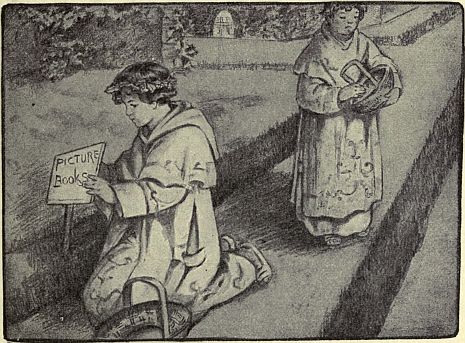
So that day the Prince had no Christmas dinner, and the next morning he finished planting the Noah’s-Ark seed.
But the very next day he was cross because he had to sow harmonicas instead of toy pianos, and had to be punished again. And so it was every other day through the whole summer.
So the Prince was very unhappy and wished he could run away, but Peter had never been so happy in his life. He worked like a bee all day, and loved to watch the Christmas gifts grow and blossom.
“They grow so slowly,” the Prince would say. “I thought I should have a bushel of new toys every month and not one have I had yet.” Then he would cry, and Peter would try to comfort him.
At last one day the Prince found a ladder in the tool house. The Monks were in the chapel, singing Christmas carols, and Peter was tuning the penny trumpets. It was a fine chance to run away. The Prince put the ladder against the Santa Claus gate, climbed up to the top, and slid down on the outside.
It was nearly Christmas now, and most of the toys had been gathered. The rocking-horses were still growing, and a few of the largest dolls; but the tops, balls, guns, blocks, and drums were all packed in baskets ready for Santa Claus.
One morning Peter was in the wax-doll bed, dusting the dolls. All of a sudden he heard a sweet voice saying, “Oh, Peter!”
He thought at first it was one of the dolls, but they could only say “Papa!” and “Mamma!”
“Here I am, Peter,” said the voice again, and what do you suppose Peter saw? It was his own dear little lame sister.
She was not any taller than the dolls around her, and she looked just like one of them with her pink cheeks and yellow hair. She stood there on her crutches, poor little thing, smiling lovingly at Peter.
“Oh, you darling,” cried Peter, catching her up in his arms. “How did you get in here?”
“I saw one of the Monks going past our house, so I ran out and followed him. When he came through the gate I came in, too, but he did not see me.”
“Well,” said Peter, “I don’t see what I can do with you. I can’t let you out, because the gate is locked, and I don’t know what the Monks will say.”
“Oh, I know!” cried the little girl. “I’ll stay out![]() 212
212![]() here in the garden. I can sleep every night in one of
those beautiful dolls’ cradles over there, and you can
bring me something to eat.”
here in the garden. I can sleep every night in one of
those beautiful dolls’ cradles over there, and you can
bring me something to eat.”
“But the Monks come out every morning to look at the Christmas gifts, and they will see you,” said her brother.
“No, I’ll hide! Oh, Peter, here is a place where there isn’t any doll.”
“Yes, that doll didn’t come up.”
“Well, I’ll tell you what I’ll do! I’ll stand here where the doll didn’t come up and try to look like one.”
“Perhaps you can do that,” said Peter. He was such a good boy that he didn’t want to do anything wrong, but he couldn’t help being glad to see his dear little sister.
He took food out to her every day, and she helped him in the garden. At night he tucked her into one of the dolls’ cradles with lace pillows and a quilt of rose-colored silk.
So they went on, day after day, and they were just![]() 213
213![]() as happy as they could be. Finally the day came
for gathering the very last of the Christmas gifts,
because in six days it would be Christmas, and Santa
Claus had to start out in a day or two.
as happy as they could be. Finally the day came
for gathering the very last of the Christmas gifts,
because in six days it would be Christmas, and Santa
Claus had to start out in a day or two.
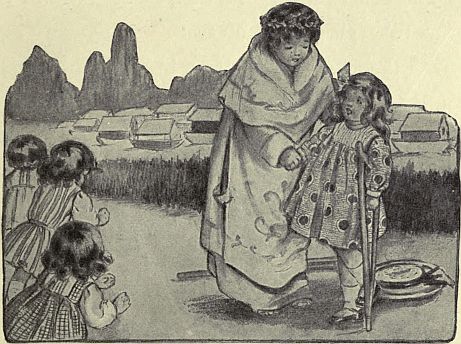
So the Monks went into the garden to be sure that everything was perfect, and one of them wore his spectacles. When he came to the bed where the biggest dolls were growing, there stood Peter’s sister, smiling and swinging on her crutches.
“Why, what is that!” said the Monk. “I thought![]() 214
214![]() that doll didn’t come up. There is a doll there—and
a doll on crutches, too.”
that doll didn’t come up. There is a doll there—and
a doll on crutches, too.”
Then he put out his hand to touch the doll and she jumped,—she couldn’t help it. The Monk jumped too, and his Christmas wreath fell off his head.
“The doll is alive!” he exclaimed. “I will pick her and show her to my brothers.”
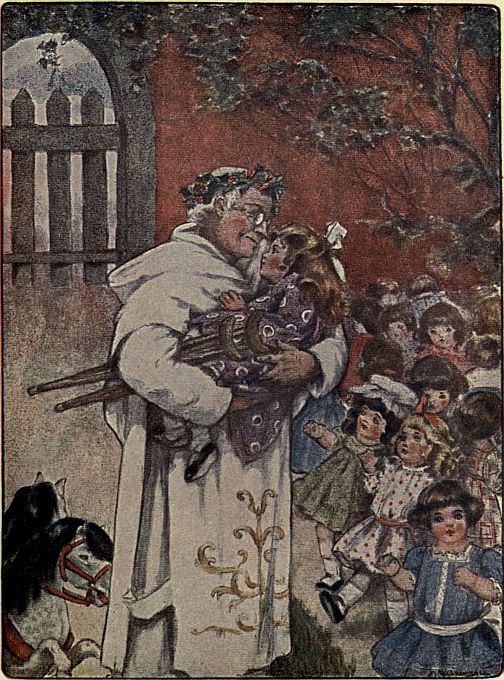
Then the good father put on his Christmas wreath, took Peter’s little sister, crutches and all, in his arms, and carried her into the chapel.
Soon the Monks came into the chapel to practise singing some new Christmas carols. There sat the near-sighted Monk, holding the big doll in his arms.
“Behold a miracle,” he said, holding up the doll. “Thou wilt remember that there was one doll planted which did not come up. Behold, in her place I have found this doll on crutches, which is—alive!”
“It is indeed a miracle,” said the Monk who was a
doctor. He took the child in his arms and looked![]() 215
215![]() at the twisted ankle. “I think I can cure this lameness,”
he said.
at the twisted ankle. “I think I can cure this lameness,”
he said.
“Take her, then,” said the abbot, “and we will sing our Christmas carols joyously in her honor.”
Peter, of course, heard the Monks talking about the miracle, and he knew what it meant. He was very unhappy to think that he was deceiving them. At the same time he did not dare to tell them for fear the doctor would not try to cure his sister.
He worked hard picking the Christmas presents, and getting them ready for Santa Claus.
On Christmas Eve he was called into the chapel. The walls were covered with evergreen, and Christmas candles shone everywhere. There were Christmas wreaths in all the windows, and the Monks were singing a Christmas carol.
On a chair covered with green branches sat Peter’s little sister, dressed in white, with a wreath of holly berries on her head.
When the carol was ended, the Monks formed in
a line with the abbot at the head. Each one had his![]() 216
216![]() hands full of the most beautiful Christmas presents.
The abbot held a wax doll, the biggest and prettiest
that grew in the garden.
hands full of the most beautiful Christmas presents.
The abbot held a wax doll, the biggest and prettiest
that grew in the garden.
When he held it out to the little girl, she drew back, and said in her sweet little voice, “Please, I’m not a miracle; I’m only Peter’s little sister.”
“Peter?” said the abbot; “the Peter who works in our garden?”
“Yes,” said the little sister.
The Monks looked at each other in dismay. This was not a miracle, it was only Peter’s little sister!
But the abbot of the Christmas Monks spoke to them. “This little girl did not come up in the place of the wax doll, and she is not a miracle. But she is sweet and beautiful, and we all love her.”
“Yes,” said the Christmas Monks, and they laid their presents down before her.
Peter was so happy he danced for joy. And when he found his little sister was cured of her lameness, he did not know what to do.
In the afternoon he took his sister and went home![]() 217
217![]() to see his father and mother. Santa Claus filled his
sleigh with gifts and drove his reindeer down to the
cottage.
to see his father and mother. Santa Claus filled his
sleigh with gifts and drove his reindeer down to the
cottage.
Oh! it was such a happy day. There was so much to tell that they all talked at once. There was so much to see that their eyes ached with looking.
But in the palace of the King it was very different. The Prince was cross and unhappy. His old toys were broken. He was tired of his old games. There was no one for him to play with, and he didn’t have one single Christmas gift.
—Mary E. Wilkins (abridged and adapted).
The words in this list are divided into syllables and marked according to Webster’s International Dictionary. The list includes all the more difficult words which occur in the text.
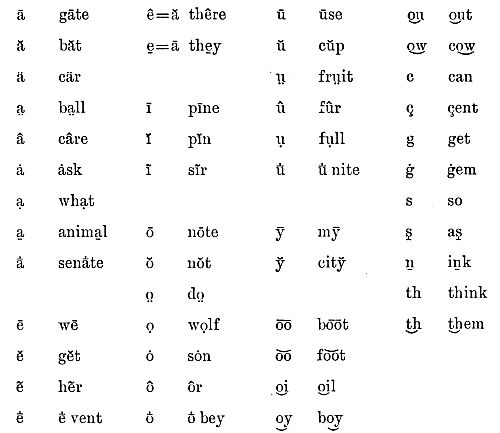
The silent letters are printed in italic.
